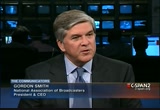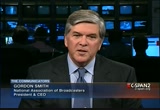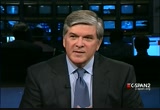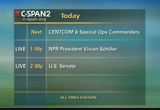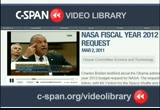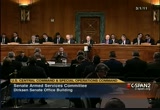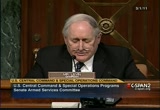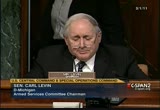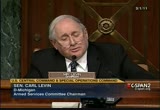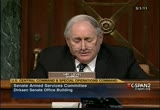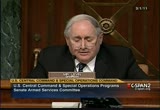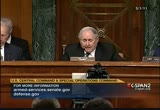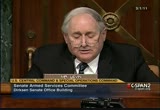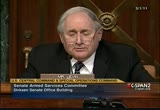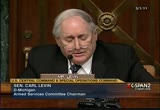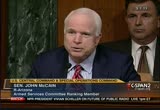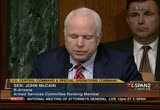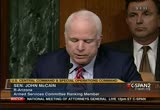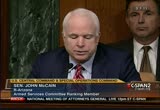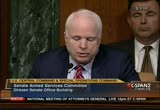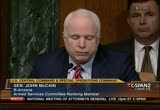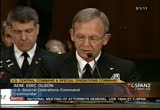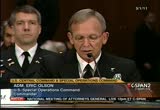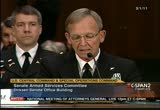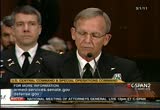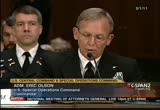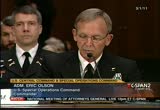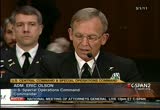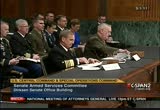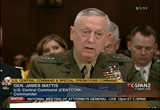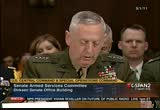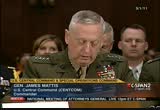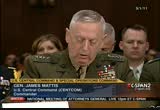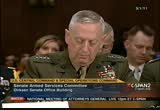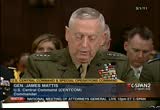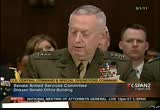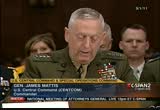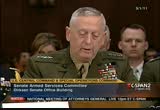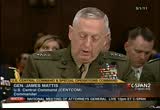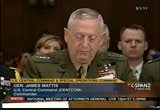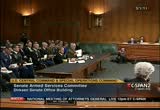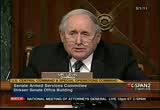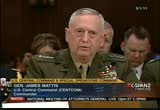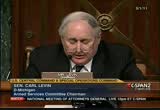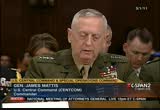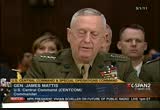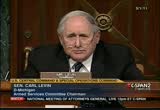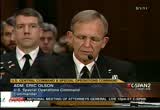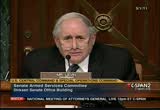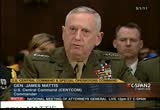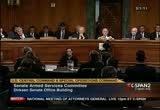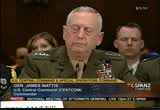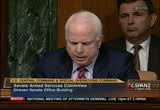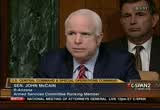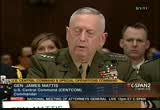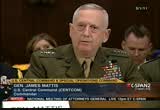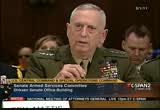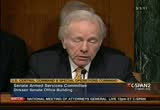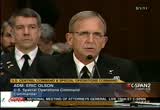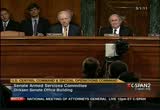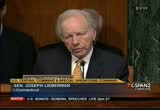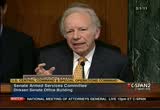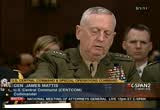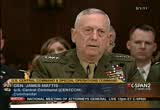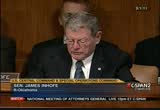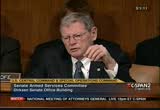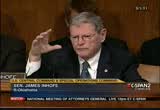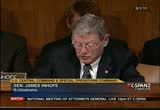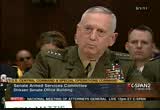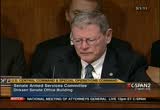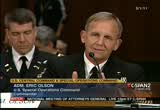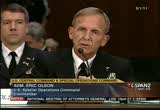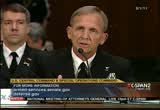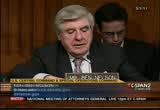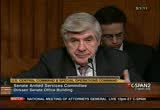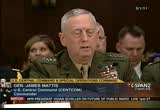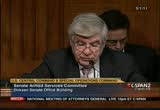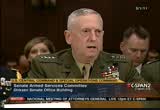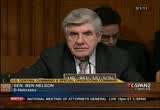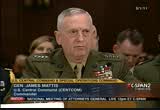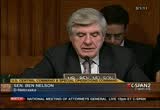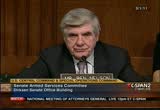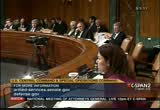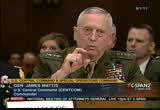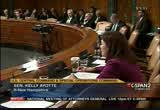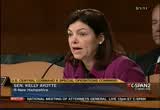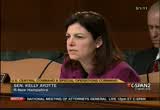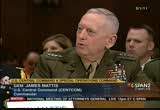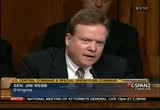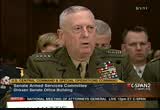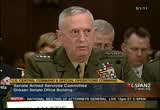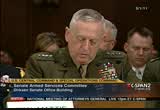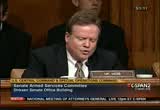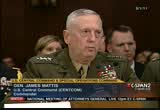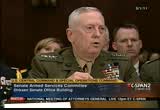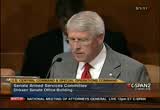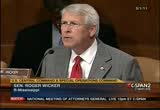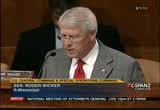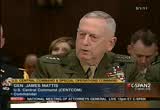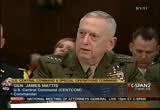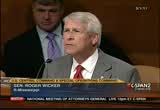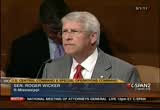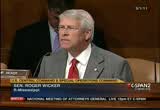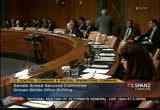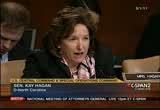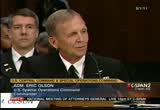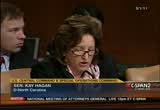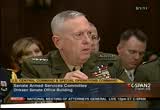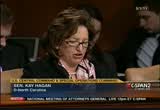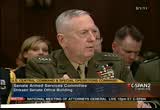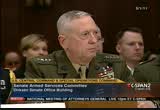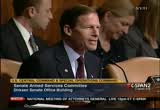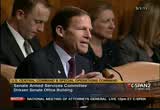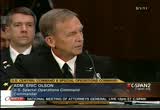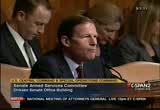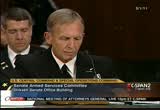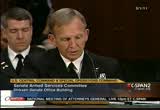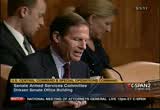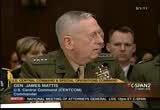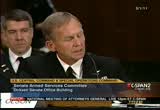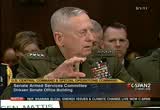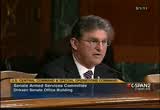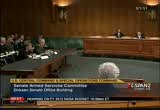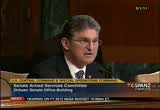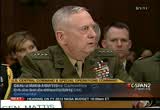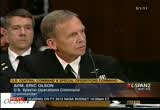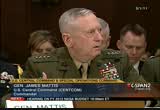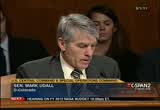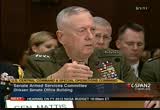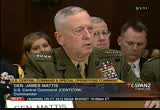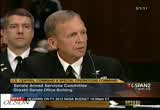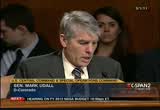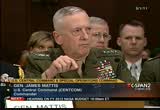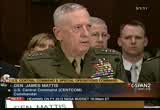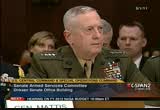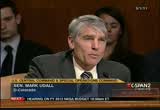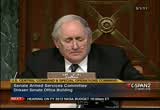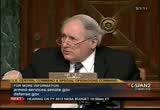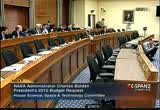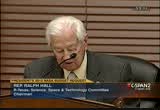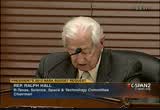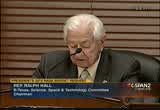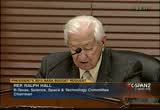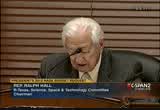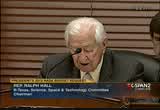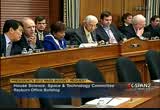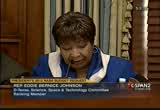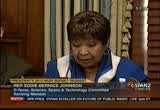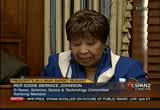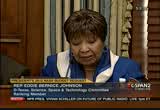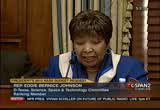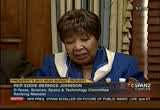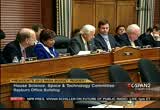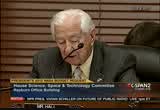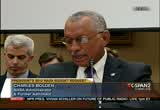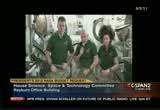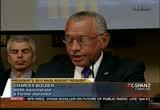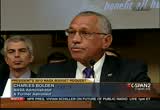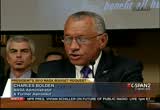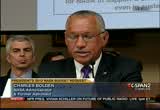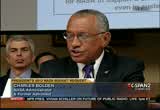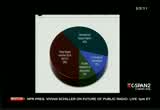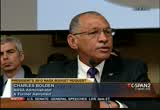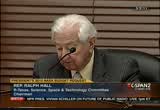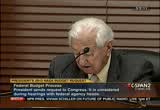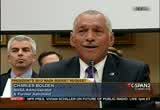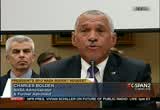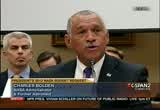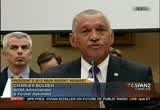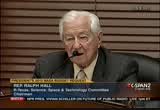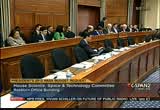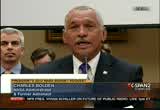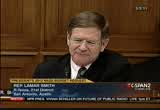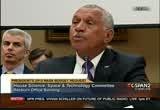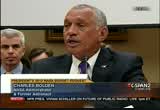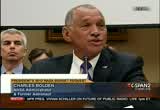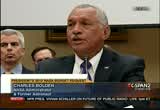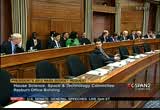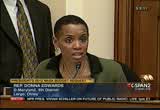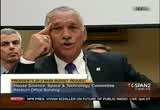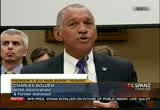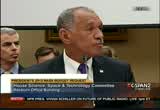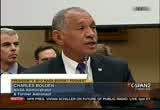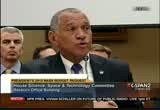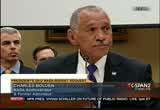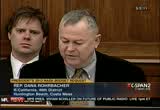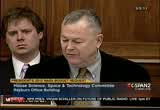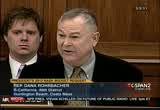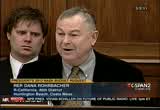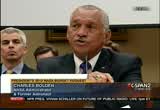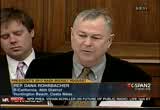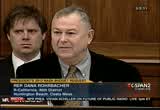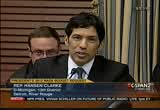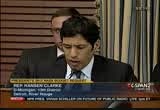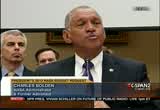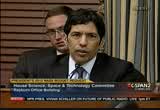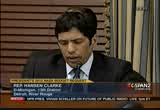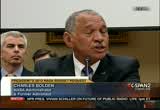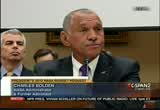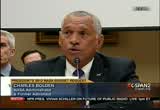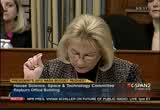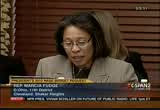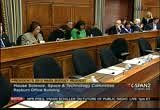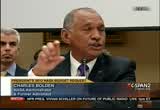tv U.S. Senate CSPAN March 7, 2011 8:30am-12:00pm EST
8:30 am
place in the digital platforms of the future too. so we're very excited about it. think it'll be successful. >> host: and we did not talk about the radio issue, the performance rights issue. is that going to move forward, and in a larger context, senator, given everything that's going on up on capitol hill, the budget and the war and issues, do you see a chance of major telecom legislation happening in this congress? >> guest: there's always a chance, but, i mean, what i tell my members is you look at the broad firmment of issues out there, and as important as these are, these issues are to us and our viewers, the american people, when you stack them up against the national debt, the national defense, the weighty issues that they're wrestling with, you know, we're not at the top of the list.
8:31 am
and usually after an election like this we have divided government, coming up to a presidential election, pretty much anything that's going to pass on it own for its policy merits has got to happen before the august recess because the window closes. everything after that that passes either passes out of political necessity or to keep the government running. and so it'll be all politics all the time pretty much after labor day. so whether it'll happen or not remains to be seen. but when it comes to us and auctions, it -- we volunteer to help, but we're really concerned about how you talk about repackaging. as for the radio issue, we, we got really close with them. we're still at the table. we hope they come back. we think there's a community of interest, but i can't and won't abandon radio, small and large,
8:32 am
to a new fee that ultimately, i think, hasen equal -- has an equal economic value of promotion. they give us play, we give them free advertising. nobody gets grammy that hasn't been on radio first. >> host: gordon smith, former senator, republican senator from oregon and since november 1, 2009, president and ceo of the national association of broadcasters. as always, we appreciate your coming on "the communicators." jonathan make as well, assistant managing editor of "communications daily." thank you. >> guest: thank you. >> "the communicators" is c-span's weekly look at the issues and people influencing telecommunications policy. if you missed any of this program with gordon smith, head of the national association of broadcasters, you can see "the communicators" again tonight and each monday night at 8 eastern,
8:33 am
5 pacific here on c-span2. >> coming up on c-span2, the heads of u.s. central command and special operations speak to a senate hearing on proposed 2012 defense programs and the situation in the middle east and north africa. >> legal issues facing states involving immigration, intellectual property rights, campaign disclosure and
8:34 am
implementation of the health care law. the event begins at noon today. you can see it live on our companion network, c-span. >> president obama's fy-12 budget for the department allows us to continue to meet these evolving threats and challenges by prioritizing our essential operational requirements. >> as cabinet secretaries meet with members of congress over their departments' budget request for next year, watch the hearings online at the c-span video library. search, watch, clip and share. it's washington your way. >> now, a senate hearing with the heads of u.s. central command and special operations. some of the issues they discussed included the requirements to impose a no-fly zone over libya, why iran remains the greatest long-term threat in the middle east, the egyptian military, and the state of u.s. special forces. they spoke before a hearing of the senate armed services committee on defense department
8:35 am
programs for 2012. this two hour and 15 minute hearing is chaired by senator carl levin. >> good morning, everybody. the committee is meeting this morning to receive testimony from admiral eric olson, special operations command, and general james mattis, commander, u.s. central command. today's hearing continues the committee's review of the missions and operational requirements of our combatant commanders in light of the priorities set out in the president's fiscal year 2012 budget request.
8:36 am
nowhere will the president's budget priorities have a greater impact than with the soldiers, sailors, airmen and marines in the centcom responsibility. the men and women have been engaged in major military operations for nearly a decade, yet in afghanistan and iraq our troops' morale is high, they are dedicated to their mission and serving with courage and distinction. we have asked so much of them. they have done everything we have asked and more. and that includes not just the service members themselves, but the families who have served our nation at home while their loved ones serve overseas. admiral olson and general mattis, on behalf of this committee, please, pass along our gratitude to the troops serving under your commands. admiral olson, it's my understanding that you plan to retire this year. after an exceptional career in which, among other things, you became the first navy seal to
8:37 am
attain the rank of four-star admiral, and you've led socom with great distinction. thank you for your outstanding service and that of your family. the department of defense, as are all federal agencies, is currently operating under a cooperating resolution -- continuing resolution that expires in a few days. last week secretary gates described this as a crisis on his doorstep. i hope that we will soon be in a position to enact a full-year appropriation at an appropriate level, and i hope, general mattis and admiral olson, that you will help the committee better understand the impact of proceeding by continuing resolution on the forces operating under your command. in iraq centcom is continuing to oversee the drawdown of u.s. forces as agreed on by president bush and prime minister maliki in the 2008 security agreement which requires all u.s. forces to be withdrawn from iraq by december 31st of this year. because of the ongoing reduction
8:38 am
of our general purpose forces in iraq, the importance of the role performed by our special operations forces as a force multiplier continuing to build the capacity of iraqi counterterrorism forces and enabling their operations against al-qaeda in iraq and other terrorist groups is even more important. as we reduce our presence, we must make sure that our special operators received a adequate support including intelligence, medical evacuation and quick reaction forces. the transition in iraq also means that the state department will take over the lead for numerous activities in iraq previously implemented by the defense department including training the iraqi police. we'd be interested in the hearing from our witnesses this morning your views on the importance of providing adequate resources to the state department and other civilian agencies to the success of that transition. in afghanistan it is essential
8:39 am
if president obama holds to his decision to set july 2011 as the date for the beginning of reductions in the u.s. forces in afghanistan. secretary gates told this committee a few weeks ago that he supported the decision to set the july 2011 date because it was necessary to, quote, grab the attention of the afghan leadership and bring a sense of urgency to them of the need for them to step up to the plate, to take ownership of the war and to recruit their own young men to fight. closed quote. admiral mullen said at the same hearing that the date, quote -- that that july 2011 date -- quote, has given the afghans a sense of urgency that they didn't have before the decision was made. the afghan army and police have added 70,000 afghan security forces over the last year and will meet the current target of
8:40 am
305,000 afghan security forces by october of this year. a large, capable, effective afghan security presence is what the taliban fears the most. because it would demonstrate that contrary to the taliban's propaganda that the war against the taliban and al-qaeda is a war the afghan people believe in, and it is being fought by an afghan security force that they believe in rather than a war waged by foreign occupiers as taliban propaganda would have it. the administration is now considering a request to grow the afghan army and police by between 45,000 and 70,000 people which could bring the total, or would bring the total afghan security force levels to a range of 352,000 to 378,000 by the end of 2012. and i have twice recently urged president obama to approve this
8:41 am
request for additional afghan troops. it is a key to the success of our mission and the faster reductions of u.s. troops. it is also far less costly in terms of u.s. casualties and taxpayer dollars than keeping large numbers of u.s. forces in afghanistan. i hope our witnesses this morning will tell us whether they support the request to build the afghan security forces by up to an additional 70,000 personnel. the presence of safe havens for terrorists across the afghanistan border in pakistan continues to pose a security threat to afghanistan and to the region. while u.s./pakistan military cooperation has ill proved in some respects -- has improved in some respects, the pakistani army has not yet gone after the sanctuaries for the haqqani network in north waziristan or the afghan taliban in pakistan.
8:42 am
over the past month the status quo in the centcom aor has changed dramatically, and this change appears to be ongoing. the protests in egypt, bahrain, jordan, yemen and other countries are examples of what president obama has correctly called a, quote, hunger for freedom. many in the middle east have been denied their democratic and human rights for too long, and can the past month is a clear demonstration of the people there demanding those rights. the united states needs to make constantly clear it supports those seeking to exercise their fundamental rights in the middle east and around the world. the committee looks forward to hearing from general mat he's on his a-- mattis on his assessment and views on these protest movements, how our security, how our counterterrorism operations and how our strategic goals are impacted by the events in the middle east and how, if at all, the nature of our
8:43 am
military-to-military relationships might change in the region as a result of these events. in the waters off the coast of somalia, the flow of international commerce continues to be impacted by the threat of increasingly aggressive pirates. just last week four americans were murdered at the hands of more than a dozen pirates bent on extracting ransoms in exchange for their lives. the committee looks forward to hearing from our witnesses about their assessment of this threat and about ongoing u.s. anti-piracy operations. iran provides the greatest challenge to the united states in the international community. while continuing to profess that its nuclear activities are for peaceful purposes, its actions indicate otherwise. the sanctions that have been imposed by the united states and most of the international community under the u.n. sanctions resolutions as well as domestic laws seem to be having some effect, but they need to be maintained and ratcheted up.
8:44 am
admiral mullen's guidance for 2011 which states that the department of defense would, quote, continue to plan for a prod range of military options -- broad range of military options should the president decide to use force to prevent iran from acquiring nuclear arms needs to be reiterated. while not the preferred option, it is important that iran understand that military actions remain on the table. i am concerned about the fraying of our special operations forces as you have put it, admiral olson, while our special operations forces have seen rapid growth over the past decade, the demand for such forces and their unique skills will continue to outpace supply for the foreseeable future. this committee stands prepared to support socom's efforts to provide the best trained and best equipped special operators to our combatant commands, and
8:45 am
we look forward to hearing from you on this matter. thank you again, both of you, for your testimony today, and let me now turn this over to senator mccain. >> thank you, mr. chairman, and let me thank our witnesses for joining us this morning. admiral olson, thank you for your many years of courageous and outstanding service to the united states navy and to the nation. general mattis, as always, we look forward to your straight talk and candid views on the issues that are so important to us. this hearing couldn't come at a more important time. senator lieberman and i have spent the past several days visiting some key countries within the centcom area of responsibility including lebanon, jordan and egypt as well as some equally critical countries that influence events within the aor such as morocco, tunisia and israel. in addition, we're all, obviously, focused on the tectonic changes that are
8:46 am
shaking countries and governments in yemen, bahrain, iran and, of course, libya. and that's to say nothing of iraq, afghanistan and pakistan which remain the focus of our military and diplomatic efforts. not since the fall of the soviet union have we seen a wave of change destabilize countries all at once than we are now witnessing. the middle east for the past several decades are now collapsing in front of us. this is, of course, deeply unsettling, but it's also an unprecedented opportunity to support the people of the middle east in shaping a new regional order that is all at once reflective of their aspirations, conducive to our interests and consistent with our values. the people of the middle east are playing the leading role in this historic endeavor, but america's armed forces are playing an indispensable role
8:47 am
strengthening and defending our friends while deterring and defeating our enemies. 2011 will be a consequential year for centcom and socom. among the vital strategic issues that were in play this year, we face the beginning of nato's transition of responsibility for security in afghanistan to local and national afghan forces amid strained and even deteriorating u.s./pakistani relations. we face hard choices about the future of u.s. defense assistance to lebanon after hezbollah's use of coercion to become the dominant actor in the government. we face the iranians' regime desires to develop a nuclear weapons capability and to exploit the current regional instability, to expand its hegemonic ambitions. we face the destabilization of
8:48 am
critical counterterrorism partners like egypt, jordan, yemen and bahrain where the headquarters of u.s. fifth fleet is now caught up in the broader debate over the people of bahrain's political future. and, of course, we face the prospect of a complete withdrawal of all u.s. troops from iraq by the end of the year despite increasing evidence and recent testimony by the secretary of defense suggesting that such a plan is not consistent with iraq's continuing security needs or our enduring interests at this time. amid these and other challenges, this year will also require increased vigilance on the part of our special operations command for the changes sweeping across north africa, the middle east and south and central asia may open up new, ungoverned spaces that could be exploited by our enemies. while our special operators continue to perform with remarkable resilience and success, the effects of nearly ten years of sustained
8:49 am
operations and repeated deployments appear to be straining this elite force. admiral olson, as the chairman has said, we are concerned by your recent comment that our special operations forces are showing signs of, quote, fraying around the edges. it's important that you lay out today what steps are being taken or need to be taken to mitigate this strain. we're also interested in socom's progress in meeting growth targets mandated by the qdr as well as any associated issues such as training or facility constraints that you are facing. we continue to see al-qaeda and affiliated movements attempting to expand their reach through the horn of africa, the arabian peninsula, central asia and beyond, and we're all eager for the assessments of both our distinguishes witnesses about the capabilities of these groups to threaten america's friends,
8:50 am
allies, interests is and homeland. what is critical to know is that the historic changes now that are shaming the broader middle east -- shaping the broader middle east are a direct repudiation of al-qaeda and its terrorist allies. the people of this dynamic and crucial region are rising up to change the character of their governments, but the revolutions they are making are largely defined not by violence, but by peaceful protests. they're inspired not by intolerant and extremist ideologies, but rather by demands for greater freedom, democracy, opportunity and justice. more than any weapon of war with which this committee must concern itself, it is these principles and the changes they are inspiring that will ultimately defeat our terrorist enemies, and if only for that reason alone, these universal values and now -- and those now struggling for them deserve our full support. thank you, mr. chairman.
8:51 am
>> thank you very much, senator mccain. admiral olson, let's start with you. >> good morning, chairman levin, senator mccain and other distinguished members of the committee. i do thank you for this opportunity to appear before you to present the current posture of the united states special operations command. we, at the united states special operations command, recognize that we were created by the congress, and that our ability to meet our nation's high expectations is due in large part to this committee's continued strong support. i'm especially pleased to share this hearing with my friend and teammate, general jim mattis. general mattis' headquarters and mine are, coincidentally, located on the same base in tampa, and we and our staffs work together quite closely. so with your permission, i will submit my report for -- >> it will be made part of the record in full. >> so the lingering threat of violence in iraq, the fragility
8:52 am
of the progress in afghanistan, the complexity of our relations with pakistan, the decentralization of al-qaeda's network, the revolutionary activity across the maghreb and into the middle east, the various destabilizing elements in latin america, africa and southeast asia, the increased intertwining of violent extremism and criminality and the persistence of piracy are all among the dalety reminders that we live in a world that poses many security challenges and some opportunities. the united states special operations forces are universeally recognized at key to our -- as key to our nation's ability to address all of these and others. as the commander of the united states special operations command, i am conditional and accountability -- responsible and accountable for the readiness of the special operations forces. with a dedicated budget and three of my component commanders, i select, organize, train, equip and deploy these forces to serve all of the
8:53 am
geographic combatant commanders. with 85% of our deployed forces currently in the central command area of operations, my colleague to my left is by far the largest customer of our product. we include many forces of legend -- the green berets, seals, rangers, air force air commandos, army night stalker air yea to haves, pararescue jumpers, today's version of marine raiders and others. the active duty practice practif civil/military operations and military information support operations are also in our ranks. these are special operations careerists. but they're backed by a magnificent assortment of administrative, intelligence, communications, engineering, logistics and other specialists who serve in special operations units on a less permanent basis at our various headquarters. we also include over 300 representatives from at least 15 other agencies within and beyond the department of defense providing senior-level counsel
8:54 am
and staff-level expertise that significantly broadens and deepens us. i am convinced that the forces we provide to the geographic combatant commanders are the most culturally-attuned partners, most lethal hunter/killers, and most responsive, agile, innovative and efficiently-effective advisers, trainers, problem solvers and warriors that any nation has to offer. in fact, we have become the model for many others. our value comes from both our high level of skills and our nontraditional methods of applying them which is to say that our principle asset is the quality of our people. whether they are conducting a precision raid, organizing a village police force, arranging for a new school or lin clinic -- or clinic or partnering with counterforces, they do so in this a manner that has impressive effect. it is undeniable that they have had impact far above their relatively small numbers.
8:55 am
they are in dozens of other countries every day contributing to regional stability by training and advising counterpart forces. this balance of direct and indirect operations must be carefully managed, but because special operations forces live in both of these worlds, we've become the force of first choice for many missions. as admiral mullen said a couple of weeks ago, special operations forces are typically first in and last out. i'm very proud of these forces, as we all should be, but i also acknowledge that there are challenges. key among them is how to meet the increasing global requirement for their capabilities. we can't grow them more than a very few percent per year, but the demand is outpacing the supply. since 9/11 our manpower has roughly doubled, our budget has roughly tripled, and is our overseas deployments have quadrupled. i have said that this great force is beginning to fray around the edges. the fabric is strong, the weave is tight, it's not unraveling,
8:56 am
but it's showing signs of wear. partial solutions include finding a process that will habitually assign units from the services to train and deploy with special operations forces insuring that our needs for local training ranges are fully met, providing buildings and facilities at the standard that our force needs and deserves, investing more broadly in the types of enabling capabilities that will relieve special operations forces from sending our own people to perform functions that could be performed by others, and expanding the services inventory of specific assets that are so essential to today's complex and and irregular warfare. we must insure that our force has the specialized equipment and advanced training that they need to survive and succeed in the complex and often violent environments in which we ask them to b serve. and underlying all of it is the need to look after our people and their families. we must rehabilitate and return to duty those of our wounded who can, care for those of our
8:57 am
wounded who can't along with their families and caregivers and provide enduring support to the families of those who have died in this action. i ask for your action to approve a defense budget for fiscal year 2011 and for your support for the fiscal year 2012 budget proposal. i also ask that you fully fund the special operations budget particularly as conventional forces begin to draw down from major operations because our forces will most likely be reallocated at the same levels to areas with pent-up demands for unique capabilities. thank you for the opportunity to appear before you today. you have reason to take great pride in what the men and women of special operations forces are accomplishing around the world today and every day. i remain humbled by my opportunity to command this formidable force and to provide it to answer our nation's most daunting security needs. and as i appear before you in this capacity for the fourth and
8:58 am
very likely the last time, i thank you for affording me the profound honor of serving my country in this way. i stand ready for your questions. >> thank you so much, admiral. we, again, are grateful to you, the men and women you command for all that you and they do. we have that pride which you made reference to at the end of your statement in them and in you. general mattis. >> thank you, mr. chairman, senator mccain, distinguished members of the committee. i appreciate the opportunity to discuss the posture and priorities of the u.s. central command, testifying alongside a friend and shipmate of many years, admiral eric olson, commander of u.s. special operations command. i have submitted a written statement and request it be accepted into the record -- >> [inaudible] >> thank you for supporting our troops and their families that carry the bankrupt of the physical and the -- bankrupt of
8:59 am
the physical and emotional burden in this tenth year of war. our forces today are among the most dedicated and skilled professionals i have served alongside in my 39 years in uniform, and they constitute a national treasure. i also recognize the commitment and sacrifices of our international partners who operate with us from the waters off somalia to the mountains of afghanistan where the largest war-fighting coalition in recent history is engaged with troops from 49 nations united in the fight against our common enemy. the strategic landscape of the broader middle east has been altered by recent events in tunisia, libya and elsewhere. we see pressure on government institutions from the aspirations of people seeking improved economic and social conditions. young people born in the information age are exchanging ideas in realtime while the long-term impact of this unrest is unknown, it presents as many opportunities as it does challenges.
9:00 am
the changes that we are seeing will man test differently in -- manifest differently in each country. people are seeking their rights, and for the most part, doing peacefully and bravely. it's too early to say how it will all turn out. it is important that we work today with the people and the governments throughout the region. we don't want to see this change slide into a new form of authoritarianism. so while there is both opportunity and danger, it requires unrelenting engagement by our nation. the central challenge for us, i believe, is how to make common cause with our friends throughout the region. there is one clear lesson we can draw from the dramatic changes underway. now more than ever, we must remain engaged with our military partners in this region. while we know each country is different, we remain committed to advancing our mutual interests in peace and
9:01 am
opportunity for all. notably in egypt, we have clearly seen the benefit of mature military-to-military relationships. the egyptian armed forces continue to demonstrate exceptional discipline and restraint under trying circumstances. our assistance has helped the egyptian military become the force, the professional force that it is today. just as our military has learned a great deal from our egyptian counterparts who have contributed a stabilizing influence in this time of transition. of course, we cannot achievement and our broad -- achieve our broader objectives in the region through military means alone. our efforts require coordination and a spirit of collaboration between highly-integrated civilian/military teams. our civilian colleagues need your full support even in this difficult fiscal environment to undertake their essential role in today's complex environment. robust resourcing for the state
9:02 am
department's mission is one of the best investments for reducing the need for military forces to be employed. together our military leaders and our diplomats not only represent a symbol of america's enduring commitment to the region, but they also build trust through partnerships that have an important stabilizing effect when trouble looms. centcom's main effort is in afghanistan where along with our afghan and coalition partners we are making undeniable progress. though some of our gains at this time remain fragile and yet reversible. al-qaeda in the border region between afghanistan and pakistan is under the most pressure they have experienced since 2001. over the past year, our enemies have lost leaders, battle space, maneuver room and the initiative. and the enemy's strategy has been undercut by the clear commitment of the international community and the afghan government to begin this summer
9:03 am
a process of fully transitioning responsibility to afghan lead by 20. 14. i support the ongoing analysis of further growth for the afghan national security forces. the greatest success of our last year, their quantifiable and growth. the range being considered is from 45,000 to 70,000 with inproving performance by the afghan security forces, we are seeing the enemy's worst nightmare coming of age. the transition process will start with a limited conditions-based withdrawal this year. our overall campaign is on track in afghanistan. our successes, as general petraeus has stated, entailed hard fighting and tough losses. and i am sure that there will be tough fighting ahead as the enemy tries to regain the initiative. finally, we must also redouble our efforts to address
9:04 am
challenges in the areas of governance and development in afghanistan. turning now to pakistan, we are strengthening and deepening our security partnership with islamabad even as we work to overcome years of mistrust and misunderstanding on both sides. the pakistanis have shifted a quarter of their army, 140,000 troops, to their western border, and we are now conducting hammer and anvil operations in close coordination with them on opposite sides of the border. pakistan's military has conducted significant counterinsurgency operations in the past decade and especially in the past two years, and they have suffered 2,757 troops killed and 8,549 wounded while also responding to urgent humanitarian needs following devastating floods in 2010. in iraq we are helping a new, more stable country emerge in a turbulent region.
9:05 am
our commitment there is transitioning from a military to a civilian-led effort. i will note that the transition underway in iraq has been enabled in large part thanks to the vital commitment and support of congress for our troops on the ground, and i want to personally offer my thanks to you. as we transition to civilian lead in iraq, it is essential that the state department be sufficiently resourced to solidify relationships between the united states and iraq for the or future. ..
9:06 am
>> iran continues to rebuff international effort for engagement, and continues to course its own population and pursue activities disrupted to regional peace and stability. including supply in arms to militant proxies in iraq and afghanistan, and supporting hezbollah in lebanon. but for the vibrant people of iran, the regime is no giant. the regime's actions have told the economy into disarray, destroyed report with the bulk of the world and has spread hate and discontent across the region. steadily eroding any international support, the regime could once muster.
9:07 am
despite this shrinking nature of the regime, i have no reason for optimism about iran's pursuit of nuclear weapons capability, it's going to ballistic missile arsenal and present destabilizing course. across the reason -- region where disrupting al qaeda and other organizations. we are actively focused on the threat of extremism in yemen, especially al qaeda in the arabian peninsula. the group that is twice attempted to attack our homeland in recent years. with our international partners, our special operations forces are putting our most violent in these and related networks under increasingly intense pressure. at the same time, the populace inspired changes that are taking place across the region undercut the message of al qaeda and other extremist groups am highlighting the bankrupt philosophies of terrorists who use violence and contribute nothing but mayhem to the innocent. as senator mccain just noted,
9:08 am
this is a direct repudiation of populace inspired, ari direct mediation of the violent extremists, because these young folks today have achieved a more change in 10 weeks than 10 years of al qaeda's murderous campaigns. so that's a snapshot of our major ongoing operations. we are focused on a number of other important missionaries to include counter piracy. there can be no stark reminder about the need for more proactive diplomatic legal and military efforts against the pirates than the brutal murder of four americans by pirates last week. this is a defining moment for the people of the region, and by extension a critical moment for central command, to remain engaged with our partners and to clear away obstacles from peace and prosperity. on that note, while israel and the palestinian territories are not in my assigned theater, lack of progress towards a
9:09 am
comprehensive middle east peace affects u.s. and centcom security interests in the region. i believe the only reliable path to lasting peace in this region is a viable two state solution between israel and palestine. this issue is one of many is that is exploited by our adversaries in the region, and issues as a recruiting tool for extremist groups. the lack of progress also creates friction with regional partners and creates political challenges for advancing our interests by marginalizing moderate voices in the region. by contrast, substantial progress on the peace process would improve sitcoms opportunity for our regional partners and to support multilateral security efforts. we recognize you face tough decisions and is constrained fiscal environment, and all of our activities at central command, we honor the obligation to be the best stewards possible
9:10 am
of our nation's monetary resources. centcom has established range of control mechanisms to execute our fiscal authorities and to apply increasing the effective oversight of all programs. finally, thank you senators, we must never forget the families of those who gave their last full measure in defense of liberty. thank you once again for your support of our men and women serving in centcom, aor and i'm prepared to answer your questions. >> thank you very much, general mattis. we will try a seven minute first round here. general, you made reference to pakistan and noted that they indeed have gone after some terrorist groups, and have suffered losses in the process. but you did not make reference to though is what troubles us a great deal, troubleshoot and i'm sure and our leadership, and
9:11 am
that's the failure of the pakistanis to go after terrorist groups in north waziristan and in quetta, and those are the groups that cross the border and attack our forces, coalition forces and the afghan people. why is it in your judgment that pakistan is not going after those terrorist groups, including the haqqani network in north waziristan, and the quetta shura? >> mr. chairman, there have been disconnects where we have not always seen eye to eye with pakistan. part of the reason these groups exist is, together with pakistan, we helped create some of them. any attempt to look at pakistan's security interests must include their relationship, the difficult relationship with india.
9:12 am
and over the years i believe that pakistan got into a position where the very groups that in some cases we helped to give birth to were -- became part of the landscape. in many cases they have moved against these areas, and not all of it has been cost free. as i noted they have lost thousands of troops killed and wounded, especially telling is the number of junior officers to have lost indicate an aggressive effort against these areas. but i think, too, it is the most difficult terrain i have ever operated in in my 39 years in uniform. and the pakistan's military's movement against these folks is continuing. we are not into our 24th month of unrelenting campaign against them. >> by the pakistanis have not
9:13 am
gone after the two groups that a given us the most trouble in afghanistan. have you pressed on the pakistan military, the importance of going after those groups? >> yes, sir i have. >> there's been a request as you indicated to increase the size of the afghan national security forces. you made reference to the request that's under consideration to be an increase between 45,000, the 70,000 above the goals set for october of this year which will be met. that target of 305,000 is already met, or will be met easily by october. now, when you made reference, you say you support further growth of afghan forces. do i understand you then to support the growth beyond the october 2011 target of 305,000,
9:14 am
and somewhere between 45,070,000 personnel is the target that you support -- 45,000, and 70,000 personnel is the target that you support? >> yes, sir, i do. i think don't have to look at whether or not we can sustain it your i believe that president karzai last week came out of his national security council and said that he now supports it, and that recommendation of course will have to be considered by the nato council. >> i will be referencing, repeatedly the importance of the july 2011 date for the beginning of reductions of american forces in afghanistan. and as weird as i indicated in my opening remarks from secretary gates and admiral mullen a week or two ago that they support the reduction beginning in july 2011 of u.s.
9:15 am
forces, but the pace to be determined by conditions on the ground. general mattis, you support the decision to set the july 2011 date as the beginning point of reductions in u.s. forces in afghanistan? >> mr. chairman, i do support it. i would like to say that i support it because it undercuts the enemy's narrative. when they say we are there to occupy afghanistan, this helps to deny the enemy that moral victory. i think, too, because it's a conditions based drawdown that begins this year, i'm comfortable with it from a military point of you. >> thank you. and admiral olson, do you support that date, the beginning of u.s. reductions? >> mr. chairman, i do. as beginning to thin out the force in order to accomplish a full transition, eventually. >> admiral, what's been the
9:16 am
effect of the afghan local police effort that the special ops folks are so deeply involved in, in the villages of afghanistan? were you working with the afghans military and police, are working at the local village level to create these local police units. can you tell us about these programs, has successfully are they? and what the partnership arrangement is with the afghans in the operations between our special ops people and the afghan local police. >> mr. chairman, that's a matter of general mattis is operational control, but i was just able to visit a couple of these afghan local police sites last week. my sense is that this is having real valued at a micro regional level. this isn't afghan government program. it's administered within the minister of the interior.
9:17 am
it is at the local level under the district governors, and is local leaders who recruit, select those who will be members of the afghan local police forces. the role of special operations forces in this is to move to these remote regions in small numbers, establish the personal relationships that are so important to gain a credibility as an advising force, and then provide some training and mentorship to these afghan local police as they gain the ability to defend their villages. in my opinion this has had quite a powerful effect locally. these are not roaming armies by any means. these are certainly locals who have organized themselves under local leadership to protect their own neighborhoods. >> it's a partnering issue? >> the partnering issue in that
9:18 am
there is a small team of u.s. forces in the village. that is then the naturally partner force of the afghan local police in that village. they stay for months at a time. so this becomes a very strong partnership, but again, it's an afghan government administered program with the u.s. forces strongly supporting it. >> and our afghans with us in any operations that we are involved in? >> sir, in all of the operations that are conducted in afghanistan there are afghans involve. >> thank you very much. senator mccain. >> thank you, mr. chairman, and a follow-up to the chairman's question. does it concern you, general mattis, that the defense ministers of various ones of our allies who have troops and commitments in afghanistan have said to me that well, if you're going to be -- begin to withdraw
9:19 am
we will begin to withdraw as well. is that a concern to you? >> it would be, sir. that's why we have to engage with them and make certain -- >> expect them to stay why we withdrawal? >> i think what we want them to do is come as we look at the transition process, senator mccain, we make certain in their area that we follow the transition guidelines. and in some cases that may mean withdrawal and some it may mean they reinvest the people that they have achieved some success with into another area. may mean that they go into training, that sort of thing. but there's no misunderstanding, the americans are getting the bulk of this fight over 100,000 troops, and i think that our commitment is pretty straightforward both fiscally and groupwise. >> i know that is not within your area of responsibility but
9:20 am
would you venture an opinion as to the difficulty of establishing a no fly zone? >> my military opinion is, sir, it would be challenging. you would have to remove the air defense capability in order to establish a no fly zone so it just -- no delusions here. it would be a military operation. it said it wouldn't be telling people not to fly airplanes. >> declaration of a no fly zone to the enemy would be, have a significant deterrent effect on their desire to fly. i think we know that to be the case. >> yes, sir. >> obviously, the events in bahrain are of great concern to you and all of us. how much iranian involvement have you seen in these -- i fully understand this is a popular uprising, but isn't it
9:21 am
in some respects a proxy conflict between saudi arabia and iran? >> i think the current tehran regime is incapable of trying to let other nations just take care of their own issues. they've got to metal and create mischief. the bahrain situation i think is a legitimate popular effort, but i'm under no illusions that the iranians would not try to take advantage of this issue, or any other, whether it be in lebanon or anywhere else in the region. >> and the loss of the headquarters would be a significant setback? >> it would be, but right now, sir, from even the opposition, our sailors who live out in town driving to and from work have encountered zero anti-americanism. and i was just there about a
9:22 am
week ago, and there is no hostility directed toward americans right now from obviously not from the government with whom we have been very good friends are 40, 50, 60 years, but not from the opposition either. it's been heartening actually. the dod school has been opened and we did. we are on about the 12th day with no violence. so it's not right now something that concerns me speak of giving the long-term needs of iraq, how were the deficiencies of the iraqi security forces such as maintenance, readiness, intelligence fusion, and particularly the building of an air force going to be addressed after u.s. troops? >> you hit a three pointer that we're concerned with. under logistics, its maintenance as well, how they keep their gear going. the intelligence fusion and the sovereignty are critical. i think right now there are going to be loose ends.
9:23 am
and less the iraqis ask us to stay and work on these issues. and those loose ends would be difficult for them to overcome on their own, sir. >> as you know, hezbollah is not a comment actor and the government of lebanon. do you think the united states should continue providing military assistance to the lebanese air force, armed forces? or is it something we should wait and see? or is it -- in other words, what's your view of that situation? >> well, we saw hezbollah use threats of violence under government. we're all very much aware that the new government is still information and will have to take a very close look at how it is organized and how it is formed to do with lebanon's future. i think that an inclusive government is the only option
9:24 am
that works with the various confessional groups that try to share power there. but i believe right now if we look at the example of egypt, and we look at what happened when we were able to maintain under some criticism that the caucus came under for giving us the amount of money that we get to the egyptian military, we were able to maintain a relationship there that paid off i think when it came time to see them either used ethically to use their position or will he see in libya. so if we look at lebanon would have never lost track of any of the equipment that we have given to them yet and to implement given to the lebanese armed forces, i think we should look at the quality of the government that it put together, recognize that the military can actually be a bulwark against maligned influence and act in our best interest once we have made that
9:25 am
announces. >> have you seen news reports that a number of people were arrested in iraq as a result of the demonstrations? >> i have, yes, sir. the ones on i think the 26th, yes, sir. >> so a concern that they would be arresting demonstrators in a country we expect them to allow demonstrations. >> yes, sir, the demonstrations were not as large as we expected but they were spread all over the country. the demonstrations by and large were peaceful. the iraqi security forces were out, and al qaeda did not take advantage i don't think they could take advantage of this opportunity to kill more innocent people. in the midst of that, there were some people who did things like a stone troops were about as many people injured on the iraqi security force side, around 50, as there were injured total and killed unfortunately on the demonstrators aside.
9:26 am
does appear to be contained in each case where government buildings were stormed. and prime minister malik he has said that he will investigate each death, each industry and make certain they know what happened in each case. so i think what was all right that was a very restrained use of force by the iraqi security forces in regards to the demonstrators. there was no opening fire on them. it was a much more restrained effort. so i don't know of what all the investigation will show yet, center, but i would like to get back to you once they see what we can fight to our intel sources. >> to get a much. thank you, mr. chairman. >> thank you, senator mccain. senator lieberman. >> thank to both of you, general mattis. thanks for your service. admiral olson, let me join those who are thanking you for your extraordinary career of service to our country and the time particularly in which you have
9:27 am
been the leader of the special operations demand. and through you really to thank everyone who served under you in that command this is a remarkable group of americans who have had the privilege to meet as i have traveled around, particularly the battle zones and honestly everyday, they are performing critical and dangerous missions with a remarkable degree of skill, bravery, and i'd say patriotism. and also of course affect. so a lot of that has grown and developed under your watch. and i can't thank you enough for that. and thank all of them. let me just give you an opportunity to develop a little more, your metaphor, the fabric is strong but around the edges there may be a little frightening. of the special operations, forces, what are the specific shortfalls that you would like
9:28 am
to see us address to make sure that the whole fabric is as strong as we would want it to be? >> thank you, sir. i got an e-mail not too long ago from an operation commander forward who said sir, the good news is the demand for special operations forces is higher than ever. the bad news is that demand is higher than ever. as 100,000 u.s. troops came out of iraq, only fewer than a thousand were from special operations forces. and at the same time we saw a requirement to move more than 1500 into afghanistan. this is a force that is as you said, has urged its way to real importance in terms of executing strategies in those conflicts. it is at the point where for some elements of our force, time at home with their families has
9:29 am
become the abnormal condition. have to adjust to being at home rather than a just to being a way. it is those elements that i'm seeking to provide some relief for in terms of thousand programs, there's no magic answer to this. it's getting a greater understanding of what the real issues are. it's shaving where we can the number of days that they are away from home for training when they are not forward deployed, as putting more predictability into their lives. and it is relieving every special operations member of any job that can be performed by anybody else. i do believe that, that the services could invest in capabilities that would provide more habitual, more timely support to special operations forces. we are in those discussions with each of the services. and i do believe that the quality of the training,
9:30 am
equipment and the facilities that we provide them are certainly a factor in ensuring that the force in which we've invested so heavily for 10 years will still be with us 10 years hands. >> i appreciate that answer and i'm sure the members of the committee look for to working with you and your staff to see if we can help you with some of those. general mattis, senator mccain say we have the opportunity to travel through some of the arab world last week where these remarkable changes are occurring. my own feeling is while you are right, there's both opportunity and challenges. the opportunity here is greater, it's remarkable to see this, these peaceful revolutions occur which are, which have got to make both the leaders of al qaeda up in the mountains feel that history may be passing them by, but also represent a real direct threat to iran which i think you correctly and bluntly
9:31 am
identified as our greatest threat, long-term threat in the region, is iran. i want to just come back to libya briefly because i was interested that in some of our visits with young people, and others, in asia, egypt where these revelations have succeeded, they are watching how the world responds to gadhafi's brutality to his own people because they are taking it as a sign. if gadhafi can survive, they worry that other leaders in the arab world will similarly try to repress revolutions. and i know the administration is considering a range of options now with regard to gadhafi. i'm just curious, i know senator mccain asked you about the no fly zone. have you and your centcom role been asked to prepare for any
9:32 am
activities relating to libya, including the provision of humanitarian assistance, medical supplies, food, the people in a liberator areas of libya? >> center, as you understand, this comes under african commands area. i have dispatches ships under the order of the secular a defense that can provide options to the president. yes, sir. >> that's reassuring to hear. i know it's a african command, but obviously there's a lot of assets in the region and i am encouraged to hear they're moving to be available. going back to iran, for some period of time as you know there was a certain -- uncertainty if i could put that way, about the extent to which the iranians were assisting the terrorist extremists in afghanistan against us. it was clear that they were
9:33 am
assisting the shia extremists in iraq, and a fortune have a lot of american blood on their hand as a result. could you tell us a little more of about the state of our conclusions about what the iranians are doing to help the caliban, or other antigovernment, anti-american forces in afghanistan? >> i can give you an incomplete answer, senator. they have given low levels of ammunition, money, that sort of support. ied components to our enemies in afghanistan. as you know at one point, the taliban and iran were very much at odds with each other to include the caliban killing a number of iranian diplomats there in northern, northern afghanistan. but the reason i say i'm giving you an incomplete answer is we are keeping a very sharp eye on some recent information we have
9:34 am
to see if they are, in fact, elevating their support, which would be very, very unwise for them to do speak of thank you, sir. my time is up speaker thank you. senator inhofe. >> thank you, mr. chairman. and again, we would all echo the remarks about your service, admiral olson, it will sorely be missed. we were talking about a lot of discussion about the withdrawal of troops, troops in afghanistan. i will say this, that occasionally when the president talks about that, he talks about conditions on the ground. so i'm not sure just what's going to happen when these timetables are. but i will say that i've had the opportunity going all the way back to the fall of 2003 when i happened to be in oklahoma. i was over in afghanistan helping the a in age trend of and they're doing a great job.
9:35 am
job. e.g. when the go back and see. we see this improvement in train. and i think this has to be recognized because because the last time is when senator hagan there now, she and i were there, it's been new year's eve in afghanistan. and had a chance to go down to the kabul military training center. and it's almost like looking at a training center here in the united states. i'm talking about the separation between artillery, infantry, how they're doing it. we had individual interviews with interpreters at random. we would select people, and the enthusiasm they have for their quality of training. so i see that just really great improvements in the quality of training over there. that was just my personal observation. general mattis, are you as excited about that as i am? >> sir, the success of this last year, especially as we see the afghan forces coming of age, very much is depending upon the
quote
9:36 am
training, the superb training, and it's going exactly as you say, we now have metrics in place where we measure them. and then we are seeing the improved capability in the field. but it has got to be the enemies worst nightmare. >> yeah, i would say that's true. when we talk to these individuals they want to be career and all that. i had looked at, when i saw the position that the egyptian military is going to be in this new transition, or whatever we're going into right now, i was somewhat pleased with it. one reason is that i've been a staunch supporter of. no, probably the most staunch supporter
9:37 am
and elsewhere, and that's what i was wanting to expand it. so i felt pretty good about that, and i would like, you know, i noticed that in the 2010, our egypt imf program is about 2 million come and drop down to about one and a half in 2011. i'm trying to get the figure now as to what it is requested for 2012. but i would like to get you on the record on your feelings about that, that program. both of you, actually. the imf program and how much that has benefited, particularly when it
9:38 am
there's a longer-term payoff, and that pay off is when we walked into the room as a brigadier general back in 2001, in the first discussion i have with a half-dozen officers is them telling me the best years of their life was in maxwell air force base, fort leavenworth and we immediately start from a position of common understandi understanding. i think this is a strategic asset to us that we can certainly maintain full support for. >> i appreciate that. you adco those sentiments. admiral olson speak was actually. you can sign up for a member of the imf fan club. i was in a position long ago a part of the application team of imf in tunisia. and that country was particularly well served by imf. >> we were just a couple days ago with prime minister netanyahu your keys referring to the earthquake, that is taking
9:39 am
place right now. and when senator lieberman was talking about the command, it occurred to me that when we were in suit card, we were with africana and said, so you have three right now that really are getting with this problem. you guys all talking to each other, do you feel there's no problem in the george yin was an earthquake has taken place in three command? >> we have a very close working relationship and a strong collaboration between us. >> admiral olson, we also had the opportunity of spending some time, and admiral losey i guess it was spent quite a time with us. and certainly impressed with what they are doing there. and then whether that your statement, you talk about, i'm reading now it says we now total close to 80,000, about a third
9:40 am
of whom are career members. special operations forces, meaning that they have been selected, trained and qualified to earn the military occupation specialty or skill code identifier of the sof. now, that would be a third of the 60,000. tell me a little bit about the other two-thirds that are not included in this category. >> yes, sir. they are the full range of enabling technical support of the capabilities, engineers, administrators, intelligence, maintenance crews and the like that make the rest of it all possible. we are a broad a capable force. we do have our own airplanes, our own helicopters, i own both, our own mini submarines. so this requires a supporting crew that has to be quite expert as will. >> we are concerned about your resources that you have because we know your mission is and what
9:41 am
you been able to do. and is everything going all right in terms of retention and recruiting? >> sir, the recruiting is good. the recruiting has been pretty consistent over the last decade, even consistent across the 911 attacks. retention has been pretty good. it has been above the service averages in almost every category. >> which is very good? >> yes, sir. we are beginning to see at the midgrade levels, sort of the eight to 10 years of service point, a slight leveling off of the retention. >> thank you. my time has expired. if you may be for the record, if you can elaborate a little bit on your numbers that you have right now as you look into the future and how this, whether the
9:42 am
60,000 is going to be increased. if that will be added, for the record. >> sir, for the record in my opinion it is adequate. i believe that the key to special operations capability beyond our current numbers is mostly in terms of supporting special operations from the much broader range of capabilities within the department. we have individually assigned, the our time in the response, to understand what special operations is and how to support special operations, requirements. i'm calling this the special operations force generation concept, and working with each other services and how they can contribute to that and how we can contribute to their force generation as that is appropriate. a specific answer to your numbers question is that, and i'm on record before this committee now in three previous
9:43 am
years saying we should not, we ought not to grow more than three to 5% per year of manpower because the quality that we need to maintain as we do that. and we are projected to do that for the next three or four yea years. >> senator nelson. >> thank you, mr. chairman. and also, let me add my appreciation, admiral olson, for your service and and best wishes for your future. the international military education training, imet, is a very important part of what i would hope to be our outrage to the world. in a way that makes good sense i've had military officials from egypt and my office before who have been here getting the imet training.
9:44 am
and i've been impressed with their appreciation and their understanding of what kind of military, of what military should do in connection with government. my question would be, you think that the difference between the way the military has behaved in libya, and the military behaved in egypt is at least in part due to their imet training? >> i think there's no doubt it is contributed, sir. each nation has its own history, its own culture, but i think the ethical performance by the egyptian military was impacted by their time spent in our schools over these last decade. >> and the same would be true in the case of tunisia as well? >> yes, sir. >> do we have any plans to try to expand the program? i know resources are tight right now, but one of the best ways of
9:45 am
avoiding future expenditures is to have applicable military operatives in other countries. and so, are there any plans that you are aware of to expand is to perhaps some other countries where there's an interest? >> i'm not aware of plans to expand it. of course, the secretary of defense and opened the door to different countries at different times to give them more school seeds. that's what a thinker i think it would be a resource issue. you have him have more instructors, more classrooms, this sort of thing. but i think it's worth looking at but i'm not aware of any plans right now to do so. >> well, we'll try to take this up with the secretary. i appreciate your response. and general mattis, i've been a strong proponent of benchmarks with metric measurements for afghanistan and pakistan. i have support for those in iraq as well. and i'm interested in your
9:46 am
evaluation of the benchmarks. the last report was in november of last year. and it's my understanding next report will be provided in april of this year i was so perhaps i'm a little ahead of the report progress. but i guess i would like to know whether or not the report in november stated that the assessment of governance in focus districts showed that 38% of the population live in areas rated as having in merging our full authority afghan governance. it doesn't reflect change from march 2010. i wonder, are we trending up or are we flatlined or are we trending down at this point? and i talk about both pakistan and afghanistan. they may be a difference in each of the country's. >> there's significant difference. let me address afghanistan were general petraeus and ambassador eikenberry lead our effort in supporting the afghan governan
9:47 am
governance. i will tell you that this is are seeing a lot of attention. we're making progress. i believe it is lacking behind the security effort. i think that is somewhat understandable. you don't get governance and if they get enough security that people can, without concern, carry out the governmental functions. at the same time we're dealing with a country that probably took several hundred billion dollars worth of damage during decades of war, according to the imf. and we translate that into the human damage and the damage to the people, the education system, this sort of thing, it's a long hard slog to create the kind of governmental organizations and the right people who can then create the kind of progress that will reflect in those metrics. pakistan, the pakistan military is where i have most of my connections, but from what i read, i have concerns about
9:48 am
pakistan's governance and their ability to meet the needs of their people. and i believe right now president karzai would be in a better position on this than the leadership, political leadership of pakistan. >> in both afghanistan and we depend on the pakistani military, the pakistani government to be able to take care of those largely isolated areas like the swat and the particular areas of their where there are safe haven for al qaeda and other taliban and other hostile operatives. and that makes it much more difficult for us to be able to contain and degrade and defeat that enemy. is that fair? >> it is very fair, sir. again, it's the federally ministered tribal area of the fault of which constitution is
9:49 am
under a different sort of governance, even within pakistan. further, i think the impact of the floods this year, we serve alongside the pakistan military that performed very well, providing relief and life-saving efforts. but those floods which were enormous in the impact, the worst in 100 years. i don't know that once the pakistan military had done what they could do in terms of saving the people from those floods, that there was a sufficiently robust governmental response been to help those people put their lives back together. >> so the attitude towards the government may not be as strong as it could be have the government had, had a fall dashed a strong follow-up response to? >> i believe you are right. i don't have the date that i have a look at specifically what i believe you are correct. >> my final question, general,
9:50 am
is as we churned out of iraq and we come upon december 31, there's some concern that maybe the iraqi government will say, will ask us to remain. i don't have any indication of that, but just a general concern that perhaps their security is not sufficient for them to be able to self govern. if that's the case, and i asked this of secretary gates recently, if that's the case and we are in a position where we might make the decision to stay, i would hope that we would do so, recognizing that from that point forward that we would expect to -- iraqi government to pick up bigger share of the cost, that we would incur. it's my understanding they are dealing with a deficit they're just as we are here, but it only adds to our deficit. and if i have to choose between
9:51 am
mine and theirs, you know what i'm going to choose. so i would hope that we would be thinking about if that happens, how we can make certain that the iraqi government picks up a bigger share at any cost that we would occur going forward that's less a question more than a wish. and in that regard, i hope that you will keep that, that in my because obviously it will come under your come in directly under your jurisdiction. have you had any thoughts about that? should we be asked to stay? >> i haven't looked at specifically after a point. however, there is clearly an increasing sense of responsibility at the iraqi government towards their own security forces resourcing them. and so i think that would be a natural part of the negotiation between the two governments if we were asked to stay. >> i hope we would make that a part of the negotiation because
9:52 am
that is what we would have to do. we can't just assess the. we had left a comment agreement. thank you, general mattis. thank you for your service and all the men and women under your command. we appreciate their continued sacrifice and service and their families as well. thanks. >> thank you, senator nelson. senator ayotte? >> thank you, chairman. i also want to commend admiral olson and general mattis for your distinguished service to our country, and please express our gratitude to all of the troops ventured underneath you, for what they are doing to protect our country. in recent hearings, secretary gates as well as passionate secretary gates as well as the secretary vickers has testified that approximate one of the four detainees have been released from guantánamo have gotten back into the fight. could either admiral olson or general mattis, could you tell us a little more about what are the details regarding some of
9:53 am
the detainees who are joining the fight and have the good examples where some of these detainees have actually injured or killed american troops that have been returned back into the fight? >> senator, the best data we have which a proximate 25%, and we can confirm it where we strongly suspect they have returned. 25% is a concern to all of us involved in this war. it reinforces the enemy. it gives people a credibility, some degree of credibility because they have been in our hands. they have gotten out so yes, ma'am. it is a big concern and have there been examples where some of these detainees who have returned to the fight have asked injured our soldiers are killed our soldiers? >> i don't have a specific example of that. however, for example, we know
9:54 am
one of them is the number two person in al qaeda in the arabian peninsula. clearly, he is engaged in trying to do so. if he hasn't, just because he has been successful yet. so his intent is exactly what you're suggesting. >> well, if he himself, he is obviously directing members of al qaeda to kill an american troops, and that's a deep concern given that we released him from our detention facility. i'm deeply concerned about our policy toward detainees and released back into the theater. and i think that the least we can do for our troops is to hold those who are dangerous and not allow them to get back into theater to harm our troops. and it's absurdly something that i look forward to continuing to work with others in the senate to make sure that we have a sensible detention policy that doesn't allow these terrorists to get back into theater.
9:55 am
i know that, general mattis, again, we've emphasized that, of course, libya is not directly in your responsibility. however, i did want to ask you, you mentioned that recently you have dispatched ships to provide options and assets in the region itself. last week there were many nations who were sending military aircraft and ships to libya in order to evacuate their own citizens that were in libya. as i understand it, that we sent and chartered a civilian fairy to try to try and take the civilians that were in libya, united states citizens to get them out of libya. yet, that kerry couldn't depart port for two days due to high winds and waves. are you aware whether certain nations including the germans
9:56 am
and british actually sent military assets to be able to get its citizens out of libya? >> senator, i'm not aware of the details, the specific here. as you understand i've been a little busy in my own theater, but i think what you're saying is about right. but i can't confirm it. >> do you know whether there was, if we had wanted to, whether we could have sent military assets to be able to get our civilians out of libya as other countries did? >> man again, i don't keep the mediterranean picture -- i'm not going on as a i don't what ships or aircraft were available at the time and where they were and whether fields were open. i really can't give you a good answer on that. >> okay. but you're now, of course, sending some of our centcom assets over to assist in that area as you testified earlier?
9:57 am
>> yes, ma'am. we have. and those are to give, whether it be humanitarian or whatever options the president may want, those assets have been sent to the suez canal, yes, ma'am. >> so had you been asked to do that lastly, that was something you could have been done earlier last week as opposed where we are now? >> well, ma'am, the way company is not as a request, frankly. i get orders. but yes, ma'am. we can do it on order. obviously, i have my own requirements in the theater and it's always a balancing act that the secretary has to go through between different combatant commanders. >> the generals would have the ability of doing it last week as opposed to where we are right now. >> yes, ma'am. >> thank you very much. i appreciate your testimony, both of you testified before the committee today. and again, admiral olson, thank you so much for your distinguished service to our country. and general mattis as well.
9:58 am
>> thank you, senator ayotte. senator webb spee? thank you, mr. chairman. general mattis, greece. i'm hopeful that you can help provide us a little bit of focus in terms of how we're going to approach similar situations in the future. not long after 9/11 a coalition of afghan forces assisted by a handful of special operators or controllers kicked out the taliban in a matter of a few weeks. we were the enablers, for lack of a better term, not the instruments or the creators of societal change in the evolution. we took a different approach in iraq. we are taking different approach
9:59 am
to date in afghanistan. we have undertaken a duty, i understand what i recall the concept of negligence in the long want to undertake a duty if you don't see it all the way through you are guilty of negligence. at the same time we need to really start looking at the future in terms of how we're going to use our military. secretary gates made a speech, i'm sure you're aware of it, at west point recently, indicating that in his view these troops have the concept is not a model, troop a the concept, pretty much nation building is not a model that should be applied in the future with respect to issues of international terrorism. at the same time, general casey over the past day or two mentioned that he wouldn't be surprised to see 100,000 army
10:00 am
soldiers deployed in these types of operations 10 years from now. so i would like to hear your thoughts. where should we be moving here in the use of our grand -- ground troops, issues of combating international terrorism, general? >> senator, i think as we look towards the future i've been a horrible profit. i have never fought anywhere i expect to do, in my years. i believe that we have to take each situation on its own and we have to define the problem to hs with level of acceptability. it's got to be defined to appoint that the solution is very clear in terms of what is the strategy we must adopt. and the strategy of course is what are the ends and what are the means to get there. the one caution i would give, having studied this problem, is
10:01 am
that we cannot marry one preclusive view of war and preclude other types and say we just won't do that because the very nature of war is the enemy will gravitate toward our perceived weakness. so we are going to have to have a force that has a built-in shock absorber, basically can go anywhere and do anything. at the same time, have a moderating impact on our own strategy so we don't try to go anywhere and do everything. it's got to be vital national interest and we got to make sure we have a force that is a general or pursuit force that does not allow the enemy to think that we are leaving some form of warfare and covered, and then works against us in that direction. >> i wouldn't disagree with you on that at all. at the same time i can recall having written a piece the day after 9/11 discussing how to deal with international terrorism. and two other concepts, you
10:02 am
build your strategy off of operational concept of the enemy you're facing. two other clear concepts but never wanted to maintain your maneuverability. and number two when you're fighting mobile enemy, you are at risk whenever you occupy territory and have to defend a territory that you are occupying. and i think those are the decision points. we are moving toward the future. admiral kime any thoughts on that? >> i think when the enemy ponders state sponsored uniforms organized fighting force, and they require similar force to defeat it. but i think that's less likely in a future. i agree with secretary gates on that. we are much more likely to see the less regular kinds of warfare. the cyberwarfare that the terrorists warfare, the non-state-sponsored warfare to which the best solution is often
10:03 am
enabling another countries forces to deal with it in that region. and being as you said the supportive of force, the supportive force in that fight. >> clearly in terms of international terrorism the whole operational concept is to not align themselves with the state. and by the way, i would not in any way disagree with what general mattis just said about keeping all your options on the table, but it just seems to me with the variety of threats that face us right now, the type of response that we have made over the past eight or nine years is not a workable model. it concerns me a good bit. general, i want to ask you a question about pakistan. i've raised a number of questions over the past two years about the transparency of our funding in terms of assistance to pakistan. are you comfortable with the
10:04 am
transparency of the money that's going into pakistan that you know what is going? >> i am, senator. i have actually -- they don't do it by computer so it is all written out by hand, so we track it right down to the end user. but i got some of the most aggressive colonels and majors you can imagine in islamabad working under my vice admiral their who track this, and routinely we reject requests from now for reimbursement. so i know it's not where they just walk in with the bill and we pay it. and sometimes the ones we want more, more evidence of outweigh the numbers that we just accept and say yeah, we know you did these things so we will pay you. for example, fuel for our forces and that sort of thing. so yes, i think we do have a very good feel for whether or
10:05 am
not we are reimbursing real costs versus any fraudulent cost us. we have seen news reports that pakistan has doubled its nuclear arsenal in recent years as we have been providing assistance in other areas. do you have any worries that our assistance to pakistan has allowed them to fund programs such as their nuclear program? >> i'm confident there is no direct funding going to their nuclear program. because of my confidence in tracking the costs we are reimbursing them for now. obviously, they had their own funding, and whether not they would spend some of that elsewhere if we were not reimbursing it. >> i understand the direct money would not be going money over there. the concern that i have is if we are funding programs that they otherwise would be funding, and they're able to take that money in order to increase the nuclear
10:06 am
arsenal, it's not a healthy situation for the region and for us in my view. thank you, mr. chairman. >> thank you very much, senator webb. senator wicker. >> thank you, mr. chairman, and thank you, gentlemen. general mattis, let me follow up on a line of questioning senator mccain began. i was not in the room at the time, but i understand he got a brief answer to this so-called day of rage in iraq. so let me see if i can't explore this a little further. and in particular i would point out a "washington post" foreign service story that appeared on saturday, february 26, in which it is reported that iraqi city forces detained hundreds of
10:07 am
people including prominent journalists, artists and intellectuals in demonstrations that brought thousands of iraqis to the streets, and ended with soldiers shooting into crowds. it goes on to say that, this involved more than a dozen demonstrations across the country. they killed at least 29 people. as crowds stormed provincial buildings, force local officials to resign to free prisoners. is this, in your judgment, general, an isolated incident? or isn't it an example that is sweeping the entire region?
10:08 am
and what does it say about the popular support of the government, which recently was subject to election. and i understand the complications after the election of the government, being formed in a very fragile manner without a clear consensus? but how accurate is this depiction? and how worried should we be in this country where we have invested so much of our blood and treasure, might be just as unstable as it was under of the regime? >> senator, i can't comment directly on the accuracy of the story, because the word that i
10:09 am
have is the word doesn't have demonstration but i take that as a sign, a positive sign. boasted that happened 15 years ago under saddam. it's a national democracy. it is one that has been under very violent era, and part of our critical part of our training of the iraqi security forces has been the ethical use of force. they are also still operating against a very capable enemy, terrorist enemy. for example, the minister of defense of iraq, al qaeda, al qaeda and iraq was killed on that day. i believe it was on that day, by iraqi security forces, a very good event for us. >> was he part of the protest? >> he was not. my point is, the enemy operates in this country even as the people are trying to exercise their freedom to protest. i believe from what i'm told
10:10 am
that the number of iraqi security forces injured and the number of demonstrators injured and killed is about the same. and the reason i say, bring that up is, that's oftentimes indicator of whether or not a military just open fire on a crowd. if you open fire on a crowd with an automatic weapon and the casualties are going to be significantly higher than the ones reported to come either by the government or by a newspaper article. but i think overall, i need to check on this, frankly, i wasn't ready for your question, i need to go back and check and see if i missed something in our assessment of what happened that day. i need to get back to you, senator, because the numbers you are citing are higher than what i was told. most cases it was when a government building was attacked, and most of the injured soldiers and police were injured by rock throwing.
10:11 am
so that's the kind of framework i am looking at. >> so, i can expect your decision to supplement your answer. on the record. and i appreciate that. thanks to the larger question of whether we need to be concerned about this government falling, much as governments in the region have toppled, and are toppling one by one, what is your informed judgment as to the larger question? >> as you know, the election was very close. it took months to investigate. nine months to get a government formed in close elections in a parliamentary system. that's understandable. i think it's still a work in progress. the performance of the iraqi security forces and during that long period when there was basically a caretaker government
10:12 am
at work gives me some degree of confidence that the security forces can protect this democracy as it grows in to root. but one or two elections doesn't make the democracy, as we all know. there's a lot of work that still has to be done. right now i do not think that it's in danger of falling. >> to what extent are these supporters of mr. allawi supported of the government as it finally emerged? >> i think that still a work in progress as well. we see where mr. allawi falls out in the organization of the government, i spoke with him about two months ago in baghdad, and he was still relatively positive at that time that is going to have a meaningful role, and that would being dashed to bring the people you're referring to on board with them. since then, it has been
10:13 am
difficult to see progress, but i think it's always slower than we want to see but i think there is still progress along thosew wheg to fall out right now. t think it's still too early say. >> and finally, to what extent do we need to be concerned about iran attempting to influence the foreign policy of iraq? >> i have no doubt that iran will attempt to influence foreign policy and domestic policy as well of iraq. >> is this a serious problem were simply one of the many concerns that we have? >> i think iran is going to be left behind by this contagion, as you described it, sweeping across the region as they find that people are not interested in exchanging one of authoritarian or one like in tehran. so i think they have much, as
10:14 am
much to worry about in this contagion. and actually, i think in many cases the iraqi people are quite capable of making up their own mind without iranian help. and that will continue to manifest. but i'm not naïve about iran's intent here. >> i hope you're correct. thank you. >> senator hagan? >> thank you, mr. chairman. and i certainly want to thank admiral olson and general mattis for your excellent service to our country. thank you so much. as you know the marine corps forces, special operations commander was established in 2005 with its headquarters at camp lejeune in dr. lund. some have suggested that the personnel should be special operations for life, rather than rotating through the command on a rotational basis as they are currently. and they argued that this would help socom create and retain
10:15 am
personnel within the special cultural and language skills that are critical for success and a regular warfare and the foreign infidels defense missions. admiral olson, what is your assessment of the progress made in standing up and growing more sock, and how are they unique within the special operation forces and also could you give me your thoughts on whether the marine operations, operators should be special operations just for life, just as in the army? >> thank you ma'am. first, i can say we will be very, very proud the way the marine corps forces special operations command has been established. it did just celebrate its fifth birthday last month and they've made tremendous progress. have been deployed at the battalion level now for over a year with tremendous effect in western afghanistan and earning an awful lot of respect from the forces with which they serve. and it's been a very close partnership between the united
10:16 am
states special operations command in nsa's marine corps in building the marsoc, to the extent that it has so far. the commandant has recently approved a military occupation specialty for those who have been through selection and advanced training to be members of the marsoc, which will help us attract and retain selective members of that community. idb that sof for life as a concept with which, that ought to be limited, that there is great value to circulation, that it is good for special operations command to circulate people through its community, and to bring people from the big services into our communities so that we don't, we're not guilty of spending a cocoon too tightly around ourselves. i'm quite comfortable with the way it's going now, even those who are in for sort of want to work in the marsoc, that's not
10:17 am
at least a four year tour, and in some cases five years which goes beyond some of the other services in many cases. >> thank you. on february 17, secretary gates indicated during his testimony before this committee that it's unsustainable for the u.s. to have a societal afghan national city forces and deadly. he suggested perhaps the u.s. could contemporary fund that sort of a surge in security assistance and then reduce that as conditions in afghanistan and prove, and as the ansf becomes more capable. general mattis, can you elaborate on what the secretary gates discussed on every 17? >> i can, send a pic if you look at what happens with the taliban and beaten down and in 2001, was able to regain its balance and come back strongly, and then we have reversed over the last year
10:18 am
or two, we have reversed their successes. so we have searched our own military. data has surged, the contending nations have, about 1000 u.s., about 50,000 non-us coalition. we have about doubled that on the part of the afghans. what you're saying is we're going into a critical time, where we're going to have to fight it out. as the enemy loses and they will lose, we will succeed, and is going to come a point where you don't need as many international trips, and eventually perhaps not as many afghan troops and police because of the enemy has been taken down. so the idea that secretary gates explained about a surge right now shows the normal and and flow that could result as a result of this kind of work as the enemy's fortunes start going backwards. >> and you said you thought the ansf had also at some point
10:19 am
reduced its numbers? >> i believe that at some point after the country gets more mature, it's got more opportunity for young people so there's not the breeding ground of their four young guys to join the extremists, that the demand, the requirement for the size of those forces could well drop off. >> thank you. >> admiral mullen has indicated that the long-standing u.s. military to military relationships has contributed to the professionalism of the egyptians military. and experts have indicated that it's important to sustain egypt's annual military aid because regardless of how events unfold in egypt, the military will likely preserve its unique position within the governing system. they also argued that freezing military aid to egypt undermines the leverage that our government has to promote an effective transition and to persuade the egyptian armed forces to abide
10:20 am
by the peace treaty with israel. general mattis, what is your position on the future of the u.s.-egyptian military to military relationship? and how might restructuring the foreign military i nothing allocation to egypt impact our strategic objectives in the country, as well as the egyptian israeli peace treaty? >> senator, i believe that we should remain relentlessly engaged in the region. this is not the time to pullback. i am on the phone, for example, with general annan, the chief of defense of the egyptian military. on a routine basis. i have seen him in egypt it is a degree of professional respect their that allows us to have a very candid discussions. he has been very proud of the fact that they are a caretaker military government. they will move quickly toward elections. i don't think you can disconnect that from the expenses of his
10:21 am
officers who have spent years in our country going through schools. and i think that right now the male to male relationship and ethical performance of the egyptian military are very tightly tied together. this has to do with regional peace. this has to do with middle east peace. as you know well so no dash so well from decades between egypt and israel. and i endorse what we are doing right now, and i think we should continue. >> as far as the treaties, do you feel confident that they will abide by the treaty? >> yes, ma'am. , i do. it's in egypt's best interest as well. but i'm hesitant to get into the political arena and start forecasting things. but without a doubt our military to military relationship i think it's helpful in terms of being a stabilizing force. and i might add with a force
10:22 am
that used its authority in an ethical manner when the crisis came. >> thank you. my time is expired. >> thank you, senator hagan. senator blumenthal? >> thank you, mr. chairman. and i join in thanking both of you, admiral olson and general mattis, for your service and the service of the courageous and dedicated men and women under your command. and i want to ask a couple of questions about those men and women who are serving and sacrificing so courageously. admiral olson, last year i believe you testified that the special operations command, care coalition, was supporting 28 -- 2800 wounded special operation forces officers through a clearinghouse that works to increase the likelihood of their returning to service or having
10:23 am
lives afterwards. and i think that clearinghouse exemplifies one of the special operation forces truth, which is humans are more valuable than hardware. and emphasis that i certainly appreciate. and i wonder if you could share with the committee an update on what is being done, what the special operations command is doing to manage the kind of care, medical care, counseling, other kinds of care that are necessary for these wounded warriors? >> thank you, senator. to care coalition, and thank you for highlighting it, was especially mentioned by admiral mullen as the gold standard for the department of defense. and we are quite proud of it. part of the true value of the care coalition is that the population with which it works is small enough that relationships are personal, so
10:24 am
that when somebody called a care coalition, they are known to the care coalition. so it's difficult to scale this up to much, but so far is within a manageable level. it's been quite effective. what they do is serve as advocates for the wounded and their families, as they connect those who have need with those who are willing to provide for needs. so your term broker house is an accurate one. in addition to that we are investing more heavily than in the past and rehabilitation facilities, in physical therapy, experts and technicians at the unit level. so that those who need that frequent assistance have access
10:25 am
to it on a daily basis. and that's been hugely effective and accelerating the ability of our people to return to duty. and it is reality that the first, the instinct of virtually all of our wounded is, you know, their first comment is how soon can i get back to my unit. and so, providing them accelerated opportunity to do that has become a very important. >> you know, admiral mullen testified not long ago before this committee about the difficulty of identifying, some of the wounds, particularly when they involve trying -- traumatic brain injury or post-traumatic stress. and i wonder whether you could give the committee your assessment of how adequate, how effective the means are to diagnose and identify those kinds of problems? >> senator, frankly i think
10:26 am
we're very inadequate. i think the data does not collect any meaningful way the information that we need to not only be responsive, but perhaps more importantly, we need to be proactive and preventive in dealing with those who have suffered psychological trauma as well as physical trauma. i have established what i call the pressure on the force, task force. this is a tiger team is going from unit to unit now. i will get a back -- i will get back report in about 90 days. they will record the data into sending, rely on leaders in tuition, on the experience of teammate, and spend real time with the families to include the children, to gain an understanding of what really is happening in the force. i don't want to get out ahead of that because i don't want to taint the responses to the service, but i do look forward to receiving the recommendations from that team spirit and your
10:27 am
testimony speaks very powerfully to the potential of new developments actually on the battlefield as well as afterward in medical advances, potential r&d and technology and so forth. wonder if you could elaborate on that. and also give us your assessment on whether the resources in the 20 oh budget are adequate for the purpose of? >> sir, i would ask that it budget be supported. i don't have a strong sense of the adequacy precisely, but i believe that there is enough request in the budget to give us room to move with respect to that. in terms of medical advances, i do believe that biomedical research is very important our military, that we have expenses that are unlike -- experiences that are unlike civilian medicine and that any investment in military biomedical research
10:28 am
is a good investment. >> ninety. just one question, general mattis, if i could ask you, sir. in light of what we are seeing in the world today, the ongoing attacks by somali pirates and other developments that affect our lines of fumigation and transport at sea, i wonder if you could share your views on the adequacy of the navy's funding request with respect to submarine operations and undersea warfare for this fiscal year and the next? >> senator, i've not looked at the navy's request because as a combatant commander, i only look at whether they are filling my request with the ships they
10:29 am
ships they have today. i'm somewhat -- i will too, i get what i need when i ask for it. but clearly, i will speak to central command's future. it will be an increasingly naval future. it will not be one in which we have significant numbers of ground troops on the ground at various locations. and so, how do we maintain a navy that has the reach and can sustain our influence, reassure our friends and temper any mischief by our enemies, make certain that they realize there's a cost, i think that is critical in the central command future. ..
10:30 am
>> forces in two flavors. one is simply the strike flavor, the manhunting, thing-hunting in counterterrorism but at the same time we are in villages. >> general, we are fighting a war that is unlike conventional war. it involves counterterrorism and counterinsurgency efforts. part of it would be seen as nation-building but you've seen it in action over there and whatever it's called, it checkmates the enemy's designs. >> the other thing i would ask
10:31 am
size, can you identify the size of the enemy and how much they are being funded on the cost of their operation against us? >> identify the size of the enemy? >> are there 10,000 of them versus 100,000 of us and are they spending $100 million while we're spending $100 billion? >> there's a syndicate of organizations -- al-qaeda had been pretty much been pushed down, beaten down. they're in kind of a hang-on up in the fatar right now haqqani network is still robust, their special forces and they are linked to the taliban who are linked to do the taliban in pakistan. it's a syndicate. it splits apart. it fights each other. it fights us. it's hard to get an exact count.
10:32 am
and it will take me a little time but i will get you our best estimate on each of those groups in that syndicate. as far as the costs, i think it's very difficult to evaluate the cost but clearly we have got to look in the future to how do we become cost-imposing, use cost-imposing strategies on an enemy? rather than be in a position that you just described. >> let me just say, if i can, the best i could decipher from what we were getting information is i think it's fair to say we have 10 to 1 of the troops superior. we have 10 troops for their 1 identified and we spend about $10 for their $1. and it looks like money is not going to win this war. is that a fair statement, admiral? >> sir, i'd have to take, for the record, your numbers to
10:33 am
confirm our deny that. i do believe that -- that the presence in a variety of capacities and the whole of nation approach to afghanistan is very important. i do believe that it is less expensive to fund an insurgency than a counterinsurgency, certainly. >> and if i may ask this question, and this will be to you, admiral, i was so impressed with special ops. i will purposely go through the briefing and watch how they operate. with that being said, the pakistanis -- do you believe that you are able to identify the haqqanis and tribes if you will and their location within pakistan and your inability to go get them or assist you in getting them. is there any break in that, whatsoever? >> sir, i would -- i would say
10:34 am
that pakistan is a sovereign nation and will as sovereign nations will act in its best interest. it does not see itself threatens by those groups as our forces feel they are threatened by those troops. we are to assist pakistan at the rate they are willing to accept our assistance, sir. >> so basically we can't do a thing -- we have an ally who truly is not acting is an ally and this is just from an outsider's opinion. and looking at the operation of our people being at risk knowing where the enemy is and we can't do anything about it? >> sir, i would say in many ways pakistan is behaving as a great ally and taking upon much risk upon themselves. but there is perhaps more that can be done. i think that the senior level dialogs that are taking place are very productive in this lar >> and to both of you all, do you know the literacy rate in afghanistan has improved at all over in 10 years? >> yes it has.
10:35 am
i would have to get you the numbers and it's one of our primary recruiting tools for the afghan army. but today we have significantly higher education, and i'll get you the numbers that can verify this. >> we still -- the numbers i i have show literacy is still at 28%? >> sir, well, considering during the taliban's control, they didn't build a single school, and they've been trying to blow up the ones we're building. it had been difficult, but we are making progress, sir. i'll get you the numbers. >> and i would ask both of you this question, too. do you believe that al-qaeda still poses a threat to the united states of america and if that's still correct, since they are not a presence in afghanistan, with all of our resources and so much of our money has been dedicated in the arena, where are they now, are
10:36 am
we capable of taking the fight to them wherever it may be? >> sir, i think al-qaeda is struggling. i think that its leadership is less experienced. i think its ranks are less fractured than any time in the last decade. and they certainly have distributed -- there is al-qaeda in the arabian peninsula, al-qaeda in iraq and other al-qaeda-associated groups in the region. so there is a requirement to continue taking the fight to where they are, sir. >> general? >> they are a threat. they're under terrible pressure right now. they've gone to ground in the epicenter of this effort which is up in the fatah but they've also distributed down into al-qaeda in the arabian peninsula. they have been hit hard in iraq but they're still a threat to the iraqi government. and we see links going down into somalia with al-shabaab. >> if i may ask one question, if
10:37 am
with the tremendous budget concerns we have within our own nation, if changes are made or judgments are made to the operation as we know it in afghanistan today, do you think it will affect the outcome at all? if we reduce the funding? >> absolutely, it will, sir. it must. i mean, right now -- just in the last year and a half gotten the resources personnel, training cerp funds, that sort of thing correct. and we are right now approaching the time when we're going to see the results of all that. we're already seeing the results they're going to be very telling shortly. >> admiral? >> sir, afghanistan special operations forces are operating at the edge of their people and at the edge of their budget and a reduction in either would be detrimental to the effect. >> thank you. >> thank you, senator manchin. senator udall.
10:38 am
>> thank you for your patience and, of course, for your service. i'd like to pursue further discussion about the sanctuaries in pakistan with this lead-in. general mattis was malajot last fall in october and you spoke in your testimony what had happened there and the positive elements. fort carson troops there were from my home state of colorado so it was particularly special to be there and it was very impressive but my fear is that it's only a matter of time before insurgents reappear. their refuge in that part of pakistan is only about four hours from kandahar. and it's just -- my sense as long as the enemy of sanctuaries we're fighting with our arm tied behind our back. general, you spoke to why pakistan isn't doing more to eliminate the sanctuaries and if they can't or won't address
10:39 am
them, do you believe that the isaf -- [feedback] >> can work on the security front to overcome the challenges presented by the sanctuaries. and admiral, i would with them welcome your thoughts after the general has spoken about this. >> the troops from your state were operating and is obviously close to the border area. it is subject to impact -- being impacted on the enemy coming out of a safe havens but it's not that the pakistans have done nothing here. they've lost thousands of troops. they've had almost 30,000 of their civilians murdered by these enemies, and they are probably in a position of saying, i don't want to create more enemies right now than i already have. i mean, they're engaged in years of the longest campaign and the most costly campaign that they have faced. and i think while it's not
10:40 am
perfect, we have to remind ourselves that the only thing more difficult than fighting with allies is fighting without allies and thank god we have the 50 nations along us, 49 nations alongside us fighting in afghanistan right now. and pakistan -- i think we have to look at both what they are doing and continue to try and close the gap in our understanding with what they are not doing. and we are very candid in our discussions with pakistani leadership about this. and we'll continue to work it. however, in the area that you're referring to, that open kind of -- kind of open ground coming from kandahar over towards the border, general petraeus, thanks to the increase that the president authorized, now has a surveillance brigade from the army that's watching over that area. in other words, it's not -- it's not just a thoroughfare. the enemy is going to have a very difficult time come spring when they try to reintroduce their troops back into the area, helmand, kandahar where they lost the initiative. so we're aware of the situation.
10:41 am
we're adapting to it. and the pakistanis are doing a lot. there's more they could do but there's more we could be doing as well. this is the normal give-and-take of war, sir. >> admiral olson? >> sir, we wish they would do more. perhaps they could do more but i don't pretend to understand the internal dynamics within pakistan and certainly the strategic implications of their decision-making process to be too critical of them. >> they do have their hands full. i do know there's a school of thought that counterinsurgencies have never been successfully completed. if the insurgents have sanctuaries. and we need to continue to worry about that concept. if i might, general, admiral, i'd like to talk about some of the, again, analysis that right now we're in a strategic stalemate in afghanistan. and that's a better situation than some would argue we had a year or two or three years ago.
10:42 am
and by that i mean, neither side can achieve its aims through the use of arms alone. and a follow-on thought we'll have difficulty preserving our gains just because we are visitors, if you will, to the area without entering into some sort of negotiations. and i know there's still disagreement among many in afghanistan, both in the afghan community and in my -- isaf. my opinion is -- and i've heard this from the civilian leadership and the way home is through a political process and a political solution ultimately. how do we incentivize this process further and make reconciliation and reintegration move more quickly? >> senator, i think we are not in a strategic stalemate right now. if we -- i was before you a year ago, i probably would have accepted that.
10:43 am
i think that the enemy is now in a worsening situation. and what we are doing is our strategy is that we have a military component. you've seen that -- everyone knows what that is, reinforced, well-trained troops, better strategy. i can go on. then you have a civilian component and those two are married together into a combined civilian military effort. additionally, there's a diplomatic effort to end the war. taliban have to abide by the constitution and break from al-qaeda and stop using the violation and they're welcomed back in. the reconciliation process has got to be a process that is owned by the afghans because they are the ones who have got to reconcile. we can support it. we should support it. the international community is supporting it. reintegration is the bottom-up.
10:44 am
reconciliation being the top down. reintegration is where we're getting young fellows to come over to our side and there's a process to bring them on board. so you're seeing right now a strategy of how do you incentivize it? first point, make certain the enemy doesn't think they're going to win. that's what we've had to reverse in the last year. then the diplomats have more of a chance to get these other efforts reconciliation, reintegration going. i hope that answers your question. >> admiral olson, do you have any additional thoughts? >> sir, i certainly agree with john mattis said. i do think we're on a path to be able to associate from a position of strength. i do believe if the negotiation can accelerate the termination of a conflict but you've got to be able to do it from a position of strength. >> speaking of negotiations, general, india, pakistan are reportedly negotiating again
10:45 am
over such tough topics as kashmir and economic integration. i assume you and admiral willard share perspectives and are working together. would you comment on the opportunity there? my opinion if india and pakistan could reach a point which they have a little warmer relationship, it would help our efforts in afghanistan. >> i completely concur with you. admiral willard and i are in routine contact with each other as we make certain as the scene between the two baddant commands does not become a gap in our efforts to work together. at the same time, this is -- this india-pakistan reconciliation has got to be something that they take responsibility for. so we're more in a mode of making certain that what we're doing militarily is never seen as contrary to that trend. >> my time is expired. two brief comments.
10:46 am
i've met with some civilian and military leaders in afghanistan. there's interesting ideas that are taking shape which is that the afghan civilian sector ought to surge into the afghan rural communities. and that's not a new idea to you, but one to continue to acknowledge. i know the chairman has really pushed on that front as well and then secondly listening to you i was reminded -- president lincoln's great comment that it always seemed like in war the best generals were working for the newspapers. and listening to you two i think the best admirals and generals are working for the american people. thank you. >> thank you very much, senator udall. i just have a couple of questions for a second round and then we're going to adjourn over to the visitors center room 217 for a closed session. there's been a request by at least one senator for that. and we should start there, hopefully, 5 minutes to 12:00 if no one else has additional questions here. i just have two questions: one,
10:47 am
general, is the question of whether or not you expect that president karzai will be announcing later this month the first phase of provinces and districts for transition to afghan security responsibility based on the joint recommendations of isaf and afghan officials. that's what defense minister wardak told me when he met in my office. is that your understanding? >> it is, chairman. i believe it will be on the 21st of march. >> all right. the other question relates to the camp in -- iraq camp ashraf where there are iranian dissidents who are being harassed in various forms by agents of iran and also by some of maliki's people as well. now, one of the issues there the loud speakers -- apparently large numbers of loud speakers
10:48 am
which blare propaganda. and i wonder if you've taken this issue up with prime minister maliki and whether we are pressing this issue because that kind of psychological abuse is unacceptable. have you raised this with prime minister maliki? >> i will raise it with him, sir. >> has it been raised before, do you know? >> i don't know. >> make sure that it is raised? >> i will. >> if there's no other questions, we'll adjourn to that classified session and we thank both of you again for your service. we'll see you over at the visitors center. [inaudible conversations] [inaudible conversations]
10:50 am
>> we see a world of broadband and broadcast. some see a world where broadcast goes away and we think that's a huge mistake. >> tonight, the future of broadcast television with the head of the national association of broadcasters, gordon smith. "the communicators" on c-span2. >> the c-span networks, we provide coverage of politics, public affairs, nonfiction books and american history. it's all available to you on television, radio, online and on social media networking sites. and find our content anytime through c-span video library. and we take c-span on the road with our digital bus and local content vehicle. bringing our resources to your community. it's washington your way. the c-span networks, now
10:51 am
available in more than 100 million homes created by capable, provided as a public service. >> and now a house hearing looking at the president's 2012 budget request for nasa. it's $18.7 billion with $4.3 billion for the space shuttle and international space station programs. $5 billion for science. and $3.9 billion for future exploration systems. ralph hall of texas chairs the science, space and technology committee. this is just over two hours. >> where am i here. >> there's your script right here. >> all right. the committee on science, space and technology have come to order. i say to you, good morning. and thank you for being here. charlie, i think it's a morning. we'll know. i know you're good guy and likeable and an admired hero and for some of the things that i
10:52 am
say about the administration, i don't always -- i'm not talking about you directly. but you're a big guy and i know you're going to handle it. welcome here all to the hearing entitled the national aeronautics and space administration fiscal year 2012 budget request. in front of you are packets contained in the written testimony, biography and truth and testimony disclosure for today's witness, administrator charles f. bolton. i recognize myself for five minutes for an opening statement. i want to thank administrator bolton for appearing before our committee today. there are a number of significant issues facing our nation's space program and i look forward to a frank and open discussion on the issues. i'm concerned that the future of our space program is in very serious jeopardy. and has been ever since the
10:53 am
president ran a line through the word constellation. with retirement of the space shuttle, nasa faces a critical period and needs to focus its limited resources to sustain our leadership in space. as everyone knows, we're in a challenging budget environment. in times like this, it's more important than ever for nasa to have credible, realistic plans that can be understood and can be defended. it must execute the programs it has with efficiency and thrift and work closely, i think, with congress to abide by congressional legislation. it's my personal opinion that someone over at the white house seems to have very little interest in working with the congress. the president made a speech to the nation just last january. told all of us we had not only to work together and that's a good speech. we should work together. that we even had to set together that night. his speech was great. it was just two years too late. when his speech was shorter two years ago, i counted the words
10:54 am
in the january speech, 5,602 words. two years ago, the words seemed to have narrowed down to two words, we won. with no real cooperation sought from the republican side. and in the area of human space flight i'm concerned about having shared access to the international space station for the u.s. and our international partners so it can live up to its promise as a vital research laboratory. that's why congress several years ago authorized a follow-on system called constellation. the constellation program was guided by the safety recommendations of the columbia accident investigation board. it's goals and designs was well understood and by republicans and democratic congressmen working together. i'm sure you've heard that from many of us. and last year the president, without warning, cancelled constellation in favor of a commercial crew proposal that
10:55 am
assumes spending at least 6 spending in the demonstration of up to 3 to 4 privately owned and operated commercial crew systems. with no or very few details. despite repeated requests from former chairman garden and myself, nasa has never provides the basis for its cost estimate or credible plans showing how the needs of the and you say our international partners could be met at a lower cost, or on a faster development cycle than constellation. so last year, after intense and often contentious debate, congress passed the nasa authorization act of 2010. the bill was a product of compromise and no one got everything they wanted but the act contained policy elements and funding guidelines that could allow the space program to move forward. specifically, the act provided $10.8 billion over three years for the nearly designed multipurpose crew vehicle and space launch system to assure
10:56 am
the capability to supply and support the international space station for the united states and our international partners in case commercial proposals have failed to materialize. the act also urged nasa to capitalize on investments already made in the constellation program in order to save money. maintain the skilled work force and minimize further development delays. with regard to commercial crew, the act authorized 1.3 billion over three years for activities that as the authorization bill states, quote, reduce risk, develop technologies and lead to advancements that will help determine the most effective and efficient means of advancing the development of commercial crew services. commercial crew was not ignored, but to be perfectly clear, it was not and is not congress' first priority. our first priority is to continue with the development of the space launch system and
10:57 am
multipurpose crew vehicles. yet, the administration's fy 2012 budget proposed completely flips the priorities of the act, significantly increasing the commercial crew funding while making deep cuts to the human exploration capability accounts which congress clearly intended to serve as our assured access to space. members of this committee have been some of nasa's most ardent supporters in the house and we make the nasa authorization act -- all of us take it very seriously. we expect nasa to make good faith efforts to abide by the policy direction and funding limitations in the law and to cease its efforts to delay resumption of full development of an assured access system. the new budget proposal disregards, yes, ignores our authorization law. knowing that we face a very difficult budget environment for years to come, it's more important than ever that nasa have credible plans, execute them well and work closely with congress to abide by the
10:58 am
legislative direction. we would like to work together with you to maintain our human space-fight program. in order to do this, nasa should embrace a policy direction that has been agreed to, which would help reduce the surprise frustration and anger from those who have been your greater supporters. i now recognize mrs. johnson for her opening remarks. >> thank you very much, mr. chairman. welcome back to the committee, administrative bolden. i want to congratulate and your agency on the successful launch of the stf 133 and i understand the mission has been very productive to state and i look forward to the crew's safe return to the earth next week. i have another appointment so i missed it and i kept telling the people going i might not miss it 'cause it might not go up that day but it did. today is the congress' first opportunity to review the
10:59 am
president's fiscal year 2012 budget request for nasa. this budget request is coming over in a very challenging budgetary environment with the appropriations for fiscal year 2011. still undecided even though we are in five months into that year. i can only imagine the challenges that you're facing in trying to plan and carrying out the challenge and activities that the nation has asked you to undertake when the budgetary sand keeps shifting. i hope that we're able to resolve our current appropriations impasse soon. but i also hope that an agreement doesn't come at the expense of critical investments this nation needs to make to prepare for the future. i consider nasa to be one of those critical investments. one only has to look at new advances, new technologies and inspiration that nasa has delivered over the years to
11:00 am
realize that the people of nasa are one of our nation's vital resources, and we need to support them and the important missions in space and earth science. aeronautics and human someplace flight and exploration. i could spend my entire time listing our fruits in past investments in nasa that have become embedded in our daily lives whether it be as broader scope as global satellite communication or as specific as smoke detectors, digital tools and our body imaging and firefighter breathing systems. other nations increasingly are recognizing the benefits of strong and active space program can deliver. and as a result, we see them being willing to make the necessary investments to build their space capabilities. however, i'm worried that we
11:01 am
here in america are forgetting how important these are in the investment to our future and how critical this skilled work force is to our future competitiveness. i'm a greater admirer to you mr. bolden and the leadership you bring to nasa and also the president who wishes you to be successful in this policy initiative. however, i have to say that i'm disappointed in the budget request that is before us today especially in light of all the work that congress undertook last year to forge a constructive path forward for the nation's space program. while last year's authorization act was by no means a perfect bill, it did clearly articulate congress' intent that nasa pursue a meaningful human space flight and exploration program that builds on all the work that has been done over the past five years. i had thought that the
11:02 am
administration agreed with the compromise that was enacted into law but i'm afraid that i do not see it reflected in the proposed nasa budget request. the request cuts nasa's overall budget plan and its human exploration budget even further than before. delays and development of the next generation vehicles eliminates any concrete destinations or milestones beyond the international space station. this is an unfortunate situation for members -- for a number of reasons. but it's most damaging impact will be both our existing highly skilled work force and on the young people who are inspired by nasa to dream of careers in science and technology. the start/stop approach defying funding goals that we have seen over the past several years can only cause us to lose the best and brightest of both groups. and they will never be replaced.
11:03 am
it will not be easy. we are really not getting them ready so we cannot afford to lose the ones we have. i know that we have great sympathy for the budget and the pressures that nasa is facing as we do. that is why i am hoping and expecting that the administration would provide some consistency of funding and direction to the agency, and i'm afraid that i don't see it in the budget that has been submitted to congress. so where do we go from here? i think that the most constructive approach for all of us here is to consider the budget request that you will present today as the beginning of a discussion, not the end. we're going to need you to tell us what you can do with your budget. not what you can't do. we need to know about space flight goals that have been set forth in successful nasa
11:04 am
authorization acts. we want to know what is possible? we need to know not just what you cannot do. make no mistake about it. this is a critical period for nasa. our leadership and preeminence in space and aeronautics is at stake. resting on our laurels from prior accomplishments is not an option. sustained investments and research technology and development must be made. not just for our sake but for our nation's stake. without this sustained investment in the years ahead, nasa will be hard-pressed to foster innovation needed to inspire young generations to pursue scientific and technical careers and that would be a bad sign for our nation. i want to work with you, administrator bolden and with chairman hull to ensure that nasa continues to instill pride and to inspire by pushing back
11:05 am
the felon tears of knowledge through exploring and living in space, advancing science and engineering and developing innovative technologies. i want to again welcome you for coming and i hope we can work together to see that we have a more positive nasa program. i yield back. thank you, mr. chairman. >> thank you, ms. johnson, for a great opening statement. and if there are members who wish to submit additional opening statements, your statements will be added to the record at this point. at this time i'd like to -- and i'm proud to introduce the witness. charles f. bolden, jr., was appointed nasa administrator by president obama and was sworn in on july 17th, 2009. he's an astronaut having flown on four shuttle missions including the mission that deployed the hubble space telescope. prior to being appointed administrator, mr. bolden served in the united states marine corps for 34 years.
11:06 am
during his service he was an and he was a test pilot. mr. bolden remembered from the corps with the rank of major general. he's a true patriot and we're very proud to have him here today. he's a friend of mine. admired by many. i observed him just several weeks ago as he nurtured the care of those who had lost others in carrying out the space program over at the cemetery and he welcomed everybody for a great day and a day we pride we launched successfully. and he's a true patriot. we're very glad to have him before us today. i recognize you, sir, for five minutes but we'll be more lenient with you since i had to read all these things to you here. if you need more time, you take it. >> thank you. >> chairman hall and ranking member johnson, members of this committee, thank you very much.
11:07 am
and chairman and ranking member, let me congratulate both of you on your new leadership roles. i want to thank you and all the members of the committee for the long-standing support that all of you have given to nasa. we have a common passion for space exploration and the benefits it brings our nation. as you take on your new responsibilities, i look forward to continuing our work together in the same collegial fashion as we have in the past. and i would like to take the liberty of also thanking you, chairman hall, for getting space back into the name of this committee. it was missing for many years and it is now back in the name so i do appreciate that. with your permission, mr. chairman, i'd like to show a very short video clip that we brought with us, if that's okay. >> and who would object? [laughter] >> commander of the international space station, along with my crew mates, nasa
11:08 am
astronauts and our russian crew mates are working on other activities today during our busy time for us. we are honored to be part of the u.s. house committee on science, space and technology. i would like to personally thank the members of this committee and the entire congress for their thoughts and prayers these past weeks as my sister in law continues her remarkable recovery. my brother, mark, and i know how much gabby appreciates the love and support she's received from each and every one of you. all of us know how deeply she believes in the work of this committee and we know how badly she would want to be with you today. again, thank you for your continued prayers for gabby and her miraculous recovery and your support for your nation's efforts in space. >> thank you for the time to show that video, mr. chairman. not a day goes by that i don't think and pray about gabby. all of us in the nasa family continue to pray for her speedy
11:09 am
and full recovery. the international space station is our anchor for future exploration and our crew members on board iss are truly serving on the frontiers on the experience. if the authorization bill passed and signed into law last fall, the station will continue as a global resource for another 10 years. it's my privileged today to discuss the president's fiscal 2012 budget request of $18.7 billion for nasa. despite the president's commitment to fiscal restraint, i am pleased that we are proposing to hold funding at the level appropriated in 2010, which, of course, continues to be our spending level under the continuing resolution. this budget request continues the agency's focus on a reinvigorated path of innovation and technological discovery leading to an array of challenging destinations and missions that engage the public. the authorization act of 2010 gave nasa a clear direction.
11:10 am
we're moving forward to implement the details of that act with this fiscal year 2012 budget. the president's budget for nasa funds all major elements of the act while supporting a diverse portfolio of key programs. because these are tough fiscal times, we also had to make some difficult choices. reductions were necessary in some areas so we can invest in the future while living within our means. this budget maintains a strong commitment to human space flight and the development of new technology. it invests in the excellent science, aeronautics research and education programs that will help us win the future. it carries out programs of innovation to support long-term job growth in a dynamic economy that will help us out-innovate, out-educate and out-build all others in the world. along with our proposed -- with our budget proposal, last week
11:11 am
we published a 2011 strategic plan. nasa's core mission in support of this vision that's on the chart remains fundamentally the same as it has since its inception in 1958. just this past week, we launched st133 on the shuttle discovery. one of the final three shuttle flights to the iss. along with supplies that will support the station's scientific research and technology demonstrations, discovery is also -- or has also delivered a robotic r2, the glory earth mission will launch from california this week on a mission to help us better understand earth and its atmosphere and the variables affecting our climate. our space program continues to venture in ways that will have long-term benefits and there are many more milestones in the very near term. yesterday, we announced three new program offices to carry out our future work. nasa brings good jobs and
11:12 am
bolsters the economy and communities across this nation. this chart shows at a very high level the scope of our activities for fiscal year 2012. our priorities in human space flight in the fiscal year 2012 budget requests are to maintain safe access for american astronauts to lower orbit as we fully utilize the international space station. facilitate safe, reliable and cost-effective u.s.-provided commercial access to lower orbit for american astronauts and their supplies as soon as possible. begin to lay the groundwork for expanding human presence into deep space, the moon, asteroids and eventually mars through development of a powerful, evolvable heavy lift rocket and multipurpose capsule. and pursue technology development to carry humans farther into the solar system that. these initiatives will enable america to retain its position as a leader in space exploration
11:13 am
for generations to come. at the same time, in our other endeavors, our priorities are to extend our reach with robots and scientific observatories to learn more about our home planet and the solar system and peer behind it to the origins of the universe. pursue ground-breaking research into the next generation of aviation technologies and carry out dynamic education programs that help develop the next generation of science, technology, engineering and mathematics professionals. that's a lot. but nasa thrives on doing big things. we have vastly increased human knowledge and our discoveries and technologies have improved life on earth. there has been some concern that nasa is abandoning human space flight. this simply is not true. these charts illustrate the percentage of nasa's budget that supports human space flight. as you can see, it's a substantial portion, 44% in this
11:14 am
chart. if i remove the cost of facilities and other support, it's 57% of our budget. here's human space flight broken out with its slice of the pie on its own we devote some resources in closing out the shuttle program. as the centerpiece of human space flight and the critical anchor for our future deep space exploration, the international space station gets the largest portion of funds. the next generation of vehicles, the evolvable heavy lift rocket and the multipurpose crew vehicle receive 39% of our human space flight by this. our continuing efforts with continued access to speaks receives a significant boost but still represent almost the smallest piece of our human space flight pie. i want to commend the nasa work force, both civil servants and contractors across the nation for their dedication to our missions during this time of
11:15 am
transition and change. these workers are our greatest assets and they make us all proud. they fully understand the risks of our exploration and welcome the challenge. they will be the ones making tomorrow happen. these are exciting and dynamic times at nasa. the challenges are here are significant. but the opportunities are great. we have to achieve big things that will create a measurable impact on our economy, our world, and our way of life. i thank you for the time to make my statement, and i look forward to your questions, mr. chairman. >> thank you. our committee rules limit questions to five minutes. i will recognize myself for five minut minutes. i want us to have the safest
11:16 am
possible assured access to the space station that meets the goals of the u.s. and our international partners and i know you want that same thing. trying to stimulate commercial competition is a worthy goal that i support but not at the expense of ensuring the safest, most robust system for our astronauts. in the augustine committee report says while there may be potential benefits of commercial services that transport crew to the lower earth orbit there's too many risk at the present time not to have a viable fall-back option for risk mitigation. congress has taken these concerns to heart and expressed them in the policy and funding direction in the nasa authorization act. and in subsequent appropriations measures including the fy 2011 continuing resolution, yet, nasa's fy 2012 budget request once again seeks to reverse congressional priorities by
11:17 am
proposing increased funding for commercial crew activities and significant reductions in the multipurpose crew vehicle and space launch system that builds on the experience, the work force of the shuttle, the work force of republicans and democrats alike and the constellation programs to assure that we have the capabilities to do the things in space that are strategically important for the united states. mr. bolen we're exasperated that nasa is not listening to us. i don't know what the problem is. but i think for this committee here, we would appreciate if you could just justify why nasa is proposing the reductions to the exploration capabilities budget that's clearly our priority? >> mr. chairman, i get your message loud and clear and so does the president. and as i mentioned, i think the budget does, in fact, reflect following your guidance -- as i
11:18 am
mentioned, these are very difficult times. things have changed significantly since last year of when we all thought that we were on a certain path. i took a look at the priorities for us established in flight, i'll tell you it was probably 2004, you will remember better than i. i came with john blaha a former astronaut. the two of us came up to brief you on potential future human spacecraft when we were trying to figure out how the future space exploration and john took a pad of paper started drawing of guidelines on why a certain spacecraft could or would not work. and you made the statement to us, you know, i understand all that you need to understand something else and you need to take this message back to the administrator. we will not lose a crew in space
11:19 am
flight and if we do those words are hell to pay. and i do not intend to have to pay any debt on losing a crew. on the safety of our crews are always my number one priority. when i looked at how we get them safely to the international space station on american-made rockets, the best way to do that -- and we can discuss this in the coming months, but the best, most efficient, perhaps fastest way to do that is by relying on the commercial entities that are well along in their development programs to provide access to lower orbit while nasa engages space exploration, usele evolvable heavy lift vehicles and a crew exploration vehicle to go do space exploration in lower orbit. so i think we are comply of the major elements of the authorization act and we made the adjustments in the balance inside that act that now causes the consternation because we wanted to make sure that i put number one priority, safety of
11:20 am
the crew. the heavy lift launch vehicle and the multipurpose crew vehicle -- while they are exploration vehicles -- and everybody needs to understand that. they are not being built to be -- to double as lower orbit vehicles. that's inefficient. i think anybody around here knows that when you try to build one system to do everything, you end up with nothing. so we are building -- we are going to build an exploration system, heavy lift launch vehicle, a multicrew vehicle. it's very inefficient and a big waste of money. but the exploration systems will have to capability of providing backup should any commercial entity fail. and failure is not meant, they failed to produce. they will produce because the commercial entities have produced for years. orbital, it's one of our -- one of our competitors right now in both the copps program and the cr program and they announced they intend to compete in
11:21 am
commercial crew. orbital has a record of success since the 1980s, 1990s. they've launched 155 successful space launches. many of my satellites that are on orbit today were put there by orbital sciences so they can produce. anyone who would try to convince you that they cannot, that american industry cannot produce, is just not being factual and they're not being truthful. and they're being disingenuous. so we have made the decision safety of the crew is number one priority. the quickest, most safest way for me to get them on there is relying on commercial entities to handle access to the lower orbit and then my focus on safety for crews that are going beyond lower orbit. >> i don't know how much more time i have, but i -- 30 years ago or over 30 years ago when i first came up here, i was lucky enough or fortunate enough to be on this committee.
11:22 am
and i took trips to the areas that launched our people, you and many other brave men and women that made the program such an american program, something we're so proud of. i had hoped at that time that some day commercial people could -- that the private sector could launch these things and take it away from government but knowing it took the tax basis, the background of all the people of the united states to make it go, i realized that was going to be a long time coming. and, i think, you have the opinion that it's basically here or we're hoping that we can reach that. and i hope we can all get together -- you and i differ on this. and some of us differ on it. some of our members here, our good valuable members agree with you 100%. so you have support on this committee and you have my support but i want to get together with the people that can make it go and be sure they can make it go. and i don't want to close the
11:23 am
bidding to anybody in the world, but i want them to do more than just sign a contract. i want them to show, as you say, that they can do that that they're contracting to do and not go halfway and look back over the shoulder and say, so sorry. that's what we have to guard against and i thank you for your answer. at this time i recognize mrs. johnson. >> thank you very much. i'm not really sure where to begin. you have indicated that nasa has planned the last shuttle mission, sts135, that funds are available. recognizing the appropriations of 2011 have not even been finalized, what priority does sts135 have relative to the priorities of nasa otherwise?
11:24 am
>> congresswoman, sts135 is on my schedule and i plan to fly sts135 in june. i have a launch date on june. and unless congress does something that changes the fiscal status of present conditions -- and you can do that. i mean, if you take drastic action and significantly reduce the amount of money that i get whenever we get a 2011 budget, then it could change things but right now i anticipate that we're -- that reasonable people can disagree and that the congress is going to come to agreements that will not cripple nasa and the rest of the nation and we will fly sts135. >> thank you very much. i yield back, mr. chairman. >> at this time, i recognize the gentleman from texas, mr. smith. >> thank you, mr. chairman. mr. bolden, less than a year ago, the president gave a speech and said that he actually wanted
11:25 am
to increase nasa's budget by, i think, $6 billion. the white house budget is now, i think, $2.5 billion less than nasa's flatline budget. you imply in your testimony that there are going to be sufficient resources for the heavy lift rocket, for the crew vehicle and for landing systems for missions for, i guess, mars, moon and the asteroids. it seems to me that a vision without resources is a fantasy and that it's not really credible to say you can complete all those missions with the resources that have been designated. and i just wondered if you would respond to that. there are a lot of professionals, a lot of nasa professionals, that just say it can't be done. and you and the administration are saying it can be done. >> so you're the only one that i've heard in the last few weeks that i'm saying anything can be done. everybody else tells me i'm
11:26 am
saying it can't. and i do believe it can't. >> so you stand by your budget and think you can accomplish all that with the resources that you have designated? >> sir, i do. >> okay. would you please give me a timetable and a cost for the missions not to mars. that's just, i think, off the books and too expensive. but give me a cost and a timetable for the missions back to the moon and to the asteroids? >> congressman, i would -- i am unable to give you a timetable at this particular time because we need to find out -- we need to find out first of all what my 2011 budget is going to be. i'm spending right now at the 2010 spending level hoping that that doesn't get dramatically reduced below that. if it does, all bets are off. i don't intend to be preaching to the choir here but i just want to remind everybody. the closer we get to the end of the fiscal year -- if i get a drastic reduction in my budget, it all hits at one time. and all bets are off. we've got to go back to the
11:27 am
drawing board. i don't anticipate that that's going to happen. it is my hope that we will be able to continue spending at the 2011 level -- 2010 level or higher and then i think we will be able -- we are planning to bring to the congress in the summer a plan for a multipurpose crew vehicle and a evolvable heavy lift system that will enable us to meet targets set by the congress and the president and those targets to date are an assist reside in the time frame and a mission on moon and a follow-on landing. and the other date you gave me in the authorization act 2016 for a heavy-lift launch vehicle and a multipurpose crew module, those were difficult in meeting even under the proposed 2011 budget and the amounts -- the level of the authorization act. and that was what i said in my
11:28 am
90-day report. that i can't -- i did not say we could not do it. what i said was given the level of funding in the 2010 authorization act, you have now made it very difficult for me to be able to execute the development of a heavy lift launch system and the multipurpose crew vehicle that is flying in 2016. i've not said i cannot do that but i don't want to mislead anyone and make them think that i'm saying we can do it. there are a lot of embassy -- embassy, a lot of industry representatives sitting behind me here who will tell that you we together as a team are going to be challenged no matter how much money you give us, you know, but we will make our effort to do what it is that the congress and the president -- >> mr. bolden, let me squeeze in one more question. there was an 8% in the astrophysics program. a lot of that is going to be
11:29 am
directed to the search for earth-like planets. what is the latest development in that area and what do you expect us to learn in the next couple of years? >> congressman, you sound like someone who's interested so i will tell you the results from wise and results to date from the kepler observatory have been next to phenomenal. we have identified -- i'm not -- i can't hold it in my brain the numbers, but we have just in the last year, we have identified literally hundreds, if not thousands -- >> what about the future in the next couple of years? >> we are going to fly additional missions that will just build upon that knowledge. kepler is not done. we are looking on a follow-on to wise. i would love to fly something that goes around venus and looks back at earth because i'm not an astrophysicist or any of that stuff but my science experts tells me if we can put something like a wise satellite in a venus orbit looking back at earth, when it comes to near-earth
11:30 am
objects, for example, things that will threaten this planet, we will have a much better look at them and a much better ability to make early determinations on their trajectory and i know this is hokey stuff to some people and they will want to laugh me off the planet. but potentially we'll save the planet one of these days. >> thank you, mr. bolden. thank you, mr. chairman. >> thank you. at this time the chair recognizes the gentleman from oregon, congressman wu. all righ all right. the gentlelady from maryland, ms. edwards. i recognize ms. edwards and i'm proud to. >> thank you, mr. chairman. and thank you, mr. administrator. i have a question that goes to the consistencies between the authorization and your budget and i think there's a number of
11:31 am
areas in what i'm trying to read is whether the authorization that we only just recently approved kind of matches your budget priorities and so i'd appreciate your speaking to that. and then further going into the details of the earth sciences. and my concern that, i think, where we tried to step up our investment in earth sciences -- it seems that, you know, some of that is being sacrificed in this budget. and so i'd like you to address that and address, if you will, the continuing resolution as we've known it. and i think we will see some evolution of that over the next couple of weeks. and what the budget impact of the c.r. would be on the earth sciences components stretching out some of these programs and in some cases, i guess, i wonder whether, you know, once you begin to stretch out or cancel
11:32 am
these programs, the investment that we've already made in them might cancel out any potential savings from canceling them so i'm a little unclear about that. and if you could give us some insight into those budget proposals i'd appreciate it. >> congresswoman, let me go back to october of last year some of you you will remember i was making phone calls to you as the debate was going on the floor about the house of the authorization act. i was criticized for being out of the country. nonetheless, i don't think any of you knew i was because i was on the phone all night when we debated the level of authorization even the passage of the authorization bill. at that time, we had not had an election. the fiscal environment in the nation was a lot different than it was one year -- one month later when the president finally signed the bipartisan
11:33 am
authorization act. so things really changed between the time that this congress labored to develop the 2010 authorization act and the time that the president signed it and now. we are -- we always face the budgetary problems that we do today, but none of us had taken the time to sit down and say, okay, we are really going to deal with it. so the 2012 budget -- it made our first effort to say we are really going to deal with the fiscal reality and so we took a cut. we made some very difficult choices in all of our programs. the earth science programs to which you question many of them went back to the dates of launch that were planned when i became the nasa administrator, you know, if you remember, when we proposed the -- the president's proposed 2011 budget, we were really happy because we had a significant amount of plus-up for earth science.
11:34 am
we were going to pull programs like clairio for a by as much as two years. we had earth science missions that were going to be flown that we didn't even know we could put on the books. today things have changed as those two examples, clarion destiny they are back to the original dates when i became administrator which is 2018. >> let me just ask you, when you add together the investments that have already been made in destiny and gpm and the joint dark energy mission and clairio -- add all of those things together are we really getting those savings by carrying or stretching these out? >> we have no choice but to stretch out destiny and clairio because we don't have the money available that we were going to use to bring them forward. and it's really not -- it appears that we're stretching them out. we're taking them back to the original launch date. those two.
11:35 am
jadem is no longer on nasa's books. we are looking for other dark energy missions to replace that. the one that, i think, came out of the astrophysics survey was w first which is a major mission of significant comes that we may or may not be able to bring in to this decade so it may have to wait. i don't see any reason to take any of our earth science missions off the table right now. i am doing everything i can to preserve those missions. >> well, you can just answer this for the record when you can, but i really would appreciate a response from the administration on the effect that these kind of program cuts have on experiments that provide satellite reporting in the present understanding and tracking tropical storms in florida and the gulf coast. monitoring wildfires in california, tornado formations in the middle of the country. i mean, these are actually
11:36 am
present-day impact when you look at the kinds of cuts that are being proposed. so if you're telling me maybe it is -- we're not going to have any storms. maybe we're not going to have any wildfires or tornadoes, that would be really cool. you'd be quite a projectionist but the reality is we won't have the tools to look at these things in the way that we need to that cost human lives, cost property and damage and impact our commerce. and with that, i'd close. >> congresswoman, i will take that for the record. and i will say i thank you for your observation. we are in dire straits as a nation when it comes to weather and climate prediction. impose is a satellite system jointly done by noaa, nasa and the department of defense which is no longer there. we have had to break it up because of problems that we had. and we need to look at our programs so that we don't allow gaps to occur if the coverage for things like weather.
11:37 am
you know, i need to get people thinking about earth science as the study of our planet, its atmosphere, its oceans and the topography and land so that we don't do dumb things like an earth satellite because it's talking about global warming. that's not -- that is not what i do. i don't do global warming. i do earth science. and so we should talk more about that. >> thank you, mr. chairman. i don't do global warming either. [laughter] >> yes, sir. >> we're on the same side there. thank you, ms. edwards and now i recommend the real veterans of this committee, mr. rohrabacher the gentleman from california. >> did somebody say global warming? [laughter] >> i want to thank you, general, for mentioning the earth objects. and again, too many people take this issue so lightly and it
11:38 am
would surprise no one if tomorrow there was a discovery made that an object was heading toward the earth that could cause tremendous loss of life, and we would be caught flatfooted. those of us who are willing to take the laughs and et cetera and the scoffing, are playing a very important role in protecting a large number of people on this planet. i understand in your budget you are taking care of a certain usage of the telescope that will ensure that that important part of identifying objects that could threaten the earth stays in play. let me know about nimpose project, had that project been on time and on budget, we wouldn't be worrying about anything right now, would we? we would have all the money we want, if we just would have run that one project all the money for heavy lift and all of that would be available because it's
11:39 am
all been wasted. your most important job, general is to make sure that never happens again. and that we never waste billions of dollars by having programs managed so inefficiently as that program was managed. i would like to place record, mr. chairman, a letter for the record of 50 leaders -- it's a letter signed by 50 leaders from the space community including former nasa executives and former astronauts and one former chairman of this very committee talking basically -- i would like to submit this letter at this point, mr. chairman. >> without objection. >> okay. these credentialed experts are urging that nasa fully fund the use of commercial companies to carry crew to the space station because it is that in and of
11:40 am
itself is a strategy that is critical for the nation's success in our space efforts. and furthermore, they point out that funding of nasa's commercial crew program would lower the cost, lower the cost of low earth orbit, thus, enabling more of nasa's budget to be applied to its focus on exploration beyond lower earth orbit and enter enabling the kind of program laid out in the nasa authorization bill. let me note that it makes no more sense today to have government employees being the ones who manage and operate and build all the space transportation vehicles than it would be if we said 20 years ago or 30 years ago, no, i'm sorry that all of the jet airplanes -- all of our jet airliners have to be built and operated by a government-run airline.
11:41 am
and, no, we have reached a technological stage when indeed the private sector can play a major role in reducing the cost of what it takes for government employees and government programs to operate. so i, number one, am one person i know that i at least on the committee sides with you and the administration at least trying to make sure that the sector can provide in partnership with nasa because that's what it's bawl. and mr. bolden, there was a stark line painted between low earth orbit operations for which it demanded a commercial process and the exploration applications for which it relied on for the
11:42 am
standard nasa development process. does this budget -- does your budget request support this structure of having that line between those two points, those two approaches. >> congressman, i'm not sure i fully understand the question, but i would like to say, i have been, unfortunately, remiss ineffectively articulating the connection among all the nasa programs. you know, we are -- we are trying to get rid of stovepipes because we're trying to stay within the budget, fulfill our obligation to live within the elements between the 2010 authorization act and the international space station as i mentioned earlier is the anchor for all future space explorations. that's our moon right now. what is going on the international space station with a full six crew, that -- we are
11:43 am
developing technologies. we are understanding science that we will need to send humans beyond lower orbit and that is the anchor. >> but we also have a lot of investment in this is the answer but we're talking about an investment of money. how much money will be saved, for example, if we would rely on a -- this private commercial transportation of crew to the space station back as compared to if we simply kept the space shuttle going for another 10 years. >> congressman, i wish i could answer that because that would be pure conjecture because we haven't felony a single commercial crew crew and i don't want to blow smoke so i don't know. >> let me conjecture and i would conjecture that we would save billions and billions of dollars in compared to keeping the shuttle going or developing other kind of craft only by a
11:44 am
nasa program. because at least these companies will be investing hundreds of millions of dollars of their own money. now, how much money have private companies and which private companies have invested their money that is money that's not coming from our budget. we're actually having people come in from the outside releasing further money from nasa to do other things. how much money are we expecting from the private sector? >> sir, i will take the for the record but i can tell you i do know it is substantially more than we have paid in our fixed cost for the copps program and we will pay in your fixed costs for the cargo resupply mission. so they -- the private entities have already invested substantially more than we have. i will take it for the record because i think your staffs were briefed earlier this week on some dollar figures. and they tried to give me that, and i couldn't remember it so i said i would take it for the record. >> thank you very much, general.
11:45 am
>> thank you. >> the chairman recognizes mr. clark, the gentleman from michigan, for five minutes >> thank you, mr. chairman hall, ranking member johnson. administrator bolden, thank you for being here. i've got a series of questions. and all of them relate to the impact of the proposed c.r. and the president's budget on nasa's ability to produce technology that can create jobs. and i don't have any space centers or rocket manufacturers in the district i represent. i'm from detroit. and i represent metro detroit. we do make cars. and back 40 years ago nasa released some structural analysis program technology that auto manufacturers were ultimately able to use to make better front ends, to design better front ends and steering linkages.
11:46 am
and you have a lot of potential to help us make better plug-in hybrid vehicles and alternative fuel vehicles. essentially, it's this. is that nasa technology has meant better automotive technology which means that detroit is able to sell better cars and that creates more jobs for the people that i represent. what, if any, is the impact of the proposed c.r. and the president's budget on these types of initiatives that can be commercialized to create good jobs in our country? >> congressman, i don't want to speculate on what the impact of what a potential c.r. would be but in the president's budget it will allow us to continue the technology and technological innovation that is -- that was -- that has always been the hallmark of this administration. and if i may, i would suggest that you go back home and brag about detroit's part in sts133. detroit is on board sts133, of
11:47 am
the person if you will of r2robonaut which is a product of a 3 year agreement between general motors and nasa. it was done on our nibbling. and general motors' nickel. it was not in anyone's budget but it was exploration technology that came back from the old constellation program. general motors came to us and said, we're losing -- we're having to pay hospital costs, injury costs on our workers who are putting the rain panel in the cars because they're having to exert so much pressure to put that panel in place and can you help us and together we started to developing r2. i don't know if it's in operation yet on the gm production line but the intent was r2 will take the place in humans in doing this high-level maintenance reducing injuries. and general motors continues
11:48 am
their work in the saa on the international space station now because r2 will be un-ferrelled in the springtime and will do a series of evolutions that are both general motors projects as well as nasa projects. you and the people of detroit are on the international space station. >> well, thank you. that gives me even more of the reason to support your agency and serve on this committee. a couple of questions i have to deal with the refocus of your agency on commercial development and also the impact of the proposed cuts on nasa education programs. but just for a backtrack, you know, the president recently said that our economic crisis was like -- was this generation's sputnik moment and decades ago when the soviet union launched sputnik, that created a huge public and political support for massive r & d investment that created a lot of economic development and
11:49 am
spurred investment in education. and a lot of people went into math, science and technology fields. some of the investments as ranking member johnson noted in nasa resulted in technology that was applied to manufactured calculators, the microchip and other technologies that we use in everyday life. how does your agency's reorientation, especially your focus on commercial development really square with that long-term commitment to overall economic activity for our country? >> congressman, the president has said the nation that out-educates wins. you will probably know that education is a passion of mine, and we have put -- we have put serious investment into education through programs like the summer of innovation. that we piloted last year and
11:50 am
will continue the next two summers. we are trying with a new -- we now have an office of chief technologists. his focus is on working with academia industry and just general researchers in trying to find innovative ways to bring value to our own economy. to grow our economy, if you will. and those are still covered in the president's 2012 budget. not to the extent that they were in the president's proposed 2011 budget but still, i think, effectively covered -- we've got to demonstrate that we can do what we say we can do. so while i would love to have more money for technology demonstrations, nasa has a history of promising a lot in technology demonstrations and then squandering the money. we do not intend to do that. we intend to work with centers like the glenn research center, the langley research center,
11:51 am
ames research center and others to bring some of the this technology development to the floor where industry and academia are participating. if you go out to colorado where one of our competitors in the commercial crew development program is building their rocket, they bring college students in and they work alongside with engineers. that's not a nasa but that is a commercial entity that is supporting nasa and the future of commercial space flight but they're bringing college students in to get them excited about being a part of this program. >> you know, in my brief eight weeks as chairman of this committee, i have my first real problem. you know, we recognize those whom i'm to call upon by the time they get here. there are two who got here at identically the same time, not only that they sat down at exactly the same time. [laughter] >> and knowing mr. ridge as a gentleman and ms. adams is a
11:52 am
very lovely lady, i'm going to recognize ms. adams for 5 or 6 or 7 or 8 minutes, whatever she wants. [laughter] >> thank you, mr. chairman. mr. bolden. i want to commend you for your statement to the safety of our crew members is our priority. and i don't think you'll see anybody in this committee that disagrees with that statement. >> i'm going to back to the authorization bill and the budget request. nasa told congress in january there was no way it could meet the 2015 flight schedule deadline. i'm going to put my glasses on for multicrew purpose vehicles. citing among other things financial constraints. based upon the requests of 4.1 billion less for these programs than what was authorized by congress, i'm concerned that you're really not interested in meeting this deadline at all. coupled with in a new interview recently with your chief technologist mr. robert brawn he was quoted as saying a few
11:53 am
vehicle for nasa space flight is and i quote, think about it as a decade if you want to put a time stamp on it. is this your time -- i mean, this is your timetable? this is something i want to know. some what you believe congress has authorized? and then the nasa authorization bill stated that the space launch system and the multipurpose crew vehicle should act as a backup in case the commercial crew is not ready in time and again, is this something you're pursuing and i want to state that when you were earlier speaking, you said this would not be a productive use of the cost and time and ability of nasa. or something similar to that. and it struck me as interesting that you said that we would not use this as a capability of this vehicle. >> yes, ma'am. we would not want to use an exploration vehicle as a lower orbiting vehicle because it would indicate two things that
11:54 am
happened. one, we had either had a loss, a physical loss of a lower orbiting vehicle whether it's soyez vehicle or a or space x or any other vehicle. it would mean we had lost a vehicle in crew and that would be why we would have to rely on a government backup. i don't ever want to get to that day that i have to -- i have failed in my effort to keep my astronauts safe if we will to rely on orion. >> shouldn't we have a backup vehicle. >> we do have a backup vehicle and it will serve as a backup to any system. i ideally would like to have -- >> and a timetable? >> timetable for this? the timetable for commercially available crew access is the 2015, 2016 time frame.
11:55 am
there is a lot of people if you ask by industry i have been told that three years from the day they sign the contract they will be able to fly commercially crew to orbit. so, you know, the sooner i can get them through the early stages where we are now, the sooner we can sign a contract and make it possible for them to fly. >> since i only have five minutes i want to get in as many questions in as possible because i have a lot of questions. on page 1 of your testimony you stated the request has an aggressive launch rate with about 40 u.s. and international missions to iss. can you please tell the committee how many of those flights are nasa flights? >> those are all nasa-related flights. >> nasa flights? >> i will get back to you on that, ma'am. >> page 2, you outline the 2012 budget priorities for human space flight. can you please tell the committee whether those priorities were developed for the most recent authorization bill or from other sources? or other methods?
11:56 am
>> the priority for human space flight has been on the record for a number years as we develop the international space station and so since that's our only destination over the next 10 years, that schedule has already laid out relatively firm. >> through the authorization bill or -- >> long before the authorization bill was even thought of. >> okay. and you said something about global climate change or climate change. and i just wanted to ask you -- i know that you reference global change. that is not climate change? >> change in the climate is -- it could be global warming. it could be global warming freezing. >> what is global change in your eyes then? >> change that we're experiencing today. when, you know, when you go out in the middle of the summer and it's blistering hot and you come in in the middle of the winter and it's the coldest winter you've ever felt, that's climate change. >> but you have a global change in your testimony and so i'm trying to determine -- >> i make -- the testimony probably says global climate change which says --
11:57 am
>> it says global change. >> i'll go back and check. >> thank you. >> we missed a word, yes >> thank you. >> thank you, i now mrs. fudge, the gentlelady from ohio, for five minutes. >> good to see you again, mr. bolden. >> always good. >> i have many nasa glenn employees in my district. i am glad to see that the president's budget request includes a diverse portfolio for glenn that has a core of capabilities. concerned about anticipated shortfalls in the center management and operation funding at nasa glenn. a continuation of fy10 level funding as described under the current c.r. represents an $8 million reduction in what is being proposed for fy12. i have been to nasa glenn and the one thing that i am certain
11:58 am
of that this is a group of extremely hard-working and brilliant scientists who know how to achieve extraordinary things on a tight budget but i'm very concerned about the effects that cuts to the center management and operations will have on the contractor work force and the facilities maintenance at glenn. government the c.r. and will have it similar effects on other centers? >> congresswoman, if i understood correctly, if you're talking about the amendment to the c.r. that took -- >> yes. >> the cross-agency support out, i don't want to speculate on what would happen to any single center and i really -- i'm going to violate my rule and i'm not going to speculate what that amount of money equals. that equals a couple of nasa centers.
11:59 am
so, in fact, the congress were to pass, you know, that c.r., i would have to find a way to either stretch money around or -- we're talking about the funds to run two nasa centers. >> correct. >> but that is not what i expect to happen. >> uh-huh. >> as i said earlier, i expect that reasonable people can disagree and come to an ultimately agreement that is best for the nation and we continue to expect that we will continue to operate at a 2010 level through the end of fiscal year 2011 and then that we will work to reach an agreement on a 2012 budget that follows along the lines of the budget that was proposed by the president and i introduced two weeks ago, you know, that will -- that will fund nasa and allow us to do the things that you want us to do. >> so there is, in fact, still a commitment to make sure when we have discussions about the fy12 budget that we are still talking about the same level that was proposed in the president's budget as we grw
129 Views
IN COLLECTIONS
CSPAN2 Television Archive
Television Archive  Television Archive News Search Service
Television Archive News Search Service 
Uploaded by TV Archive on

 Live Music Archive
Live Music Archive Librivox Free Audio
Librivox Free Audio Metropolitan Museum
Metropolitan Museum Cleveland Museum of Art
Cleveland Museum of Art Internet Arcade
Internet Arcade Console Living Room
Console Living Room Books to Borrow
Books to Borrow Open Library
Open Library TV News
TV News Understanding 9/11
Understanding 9/11